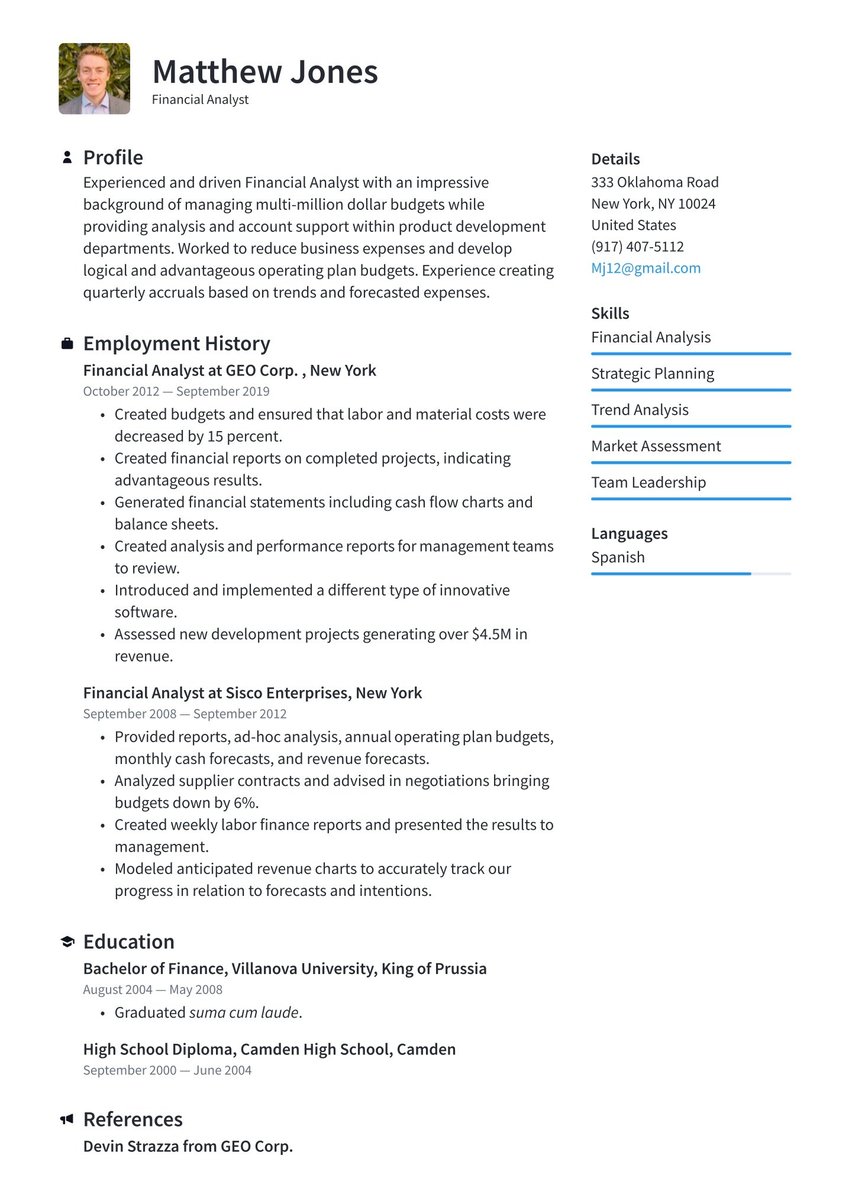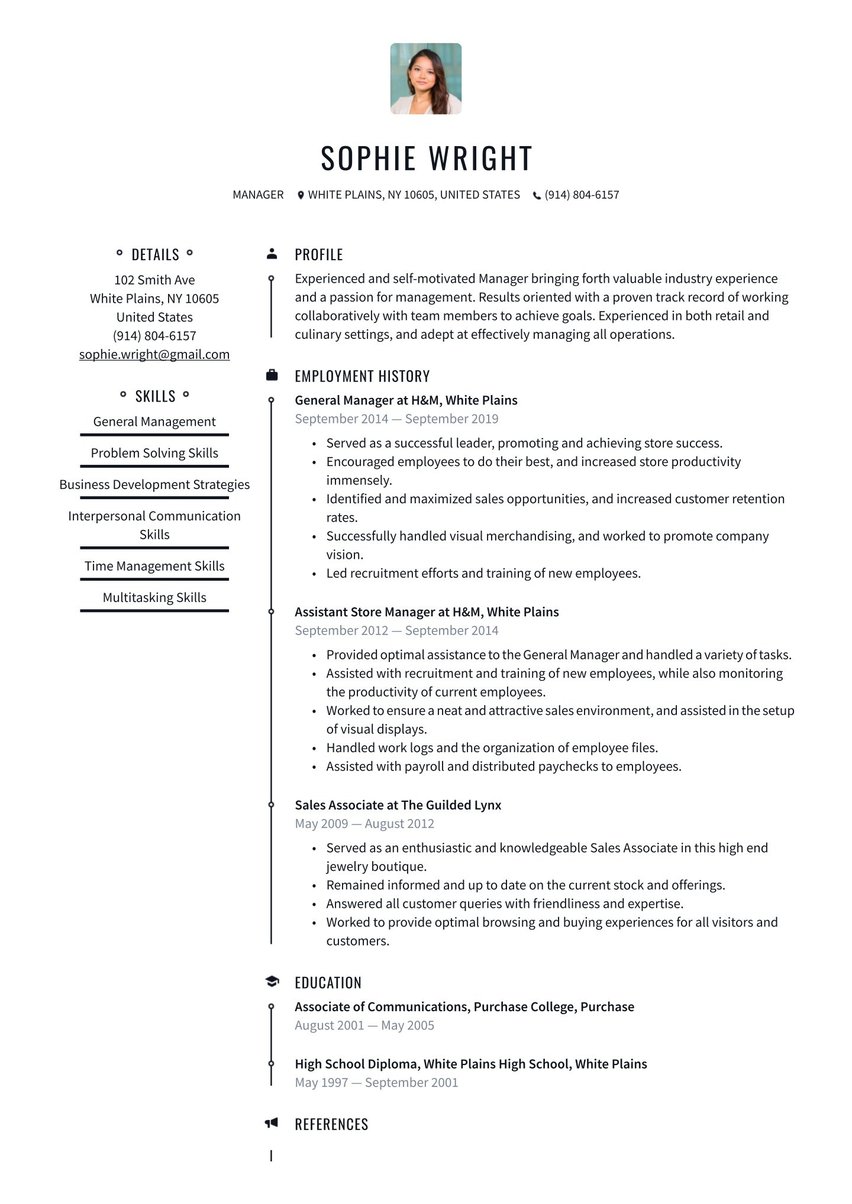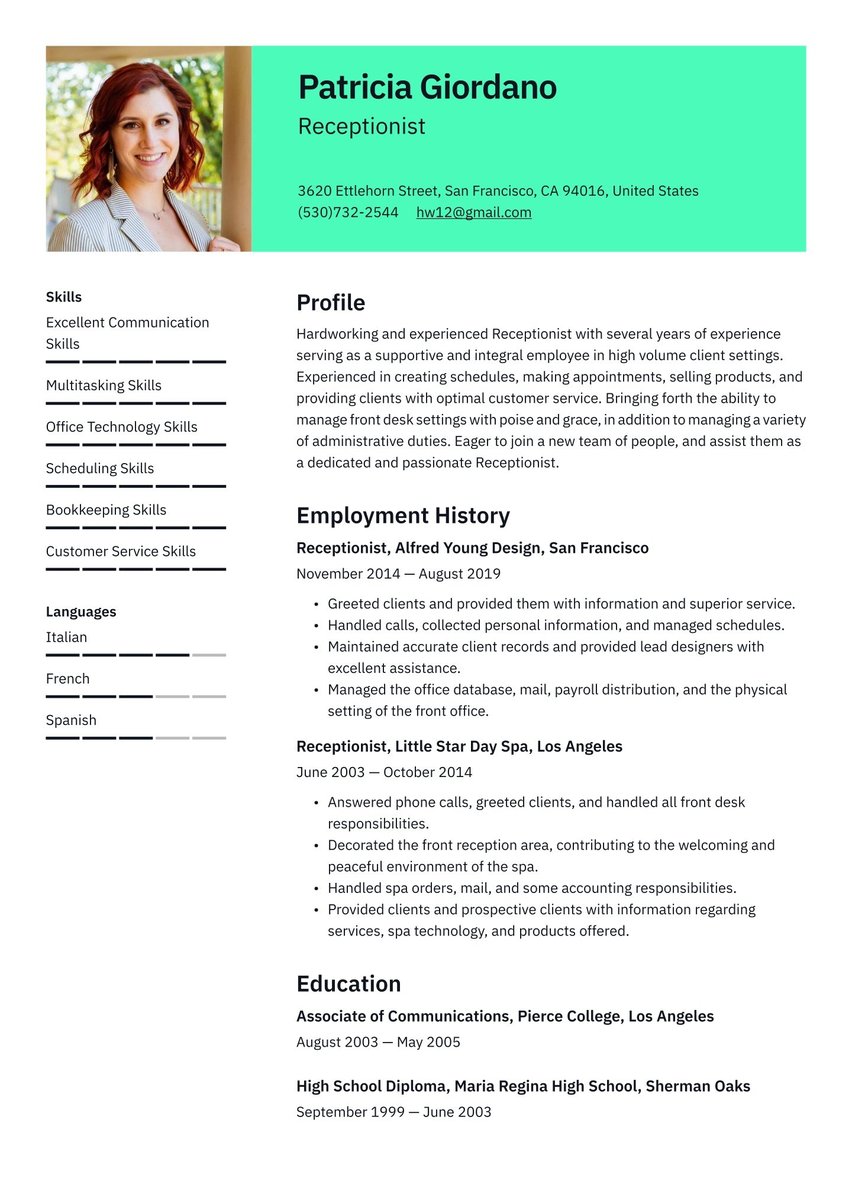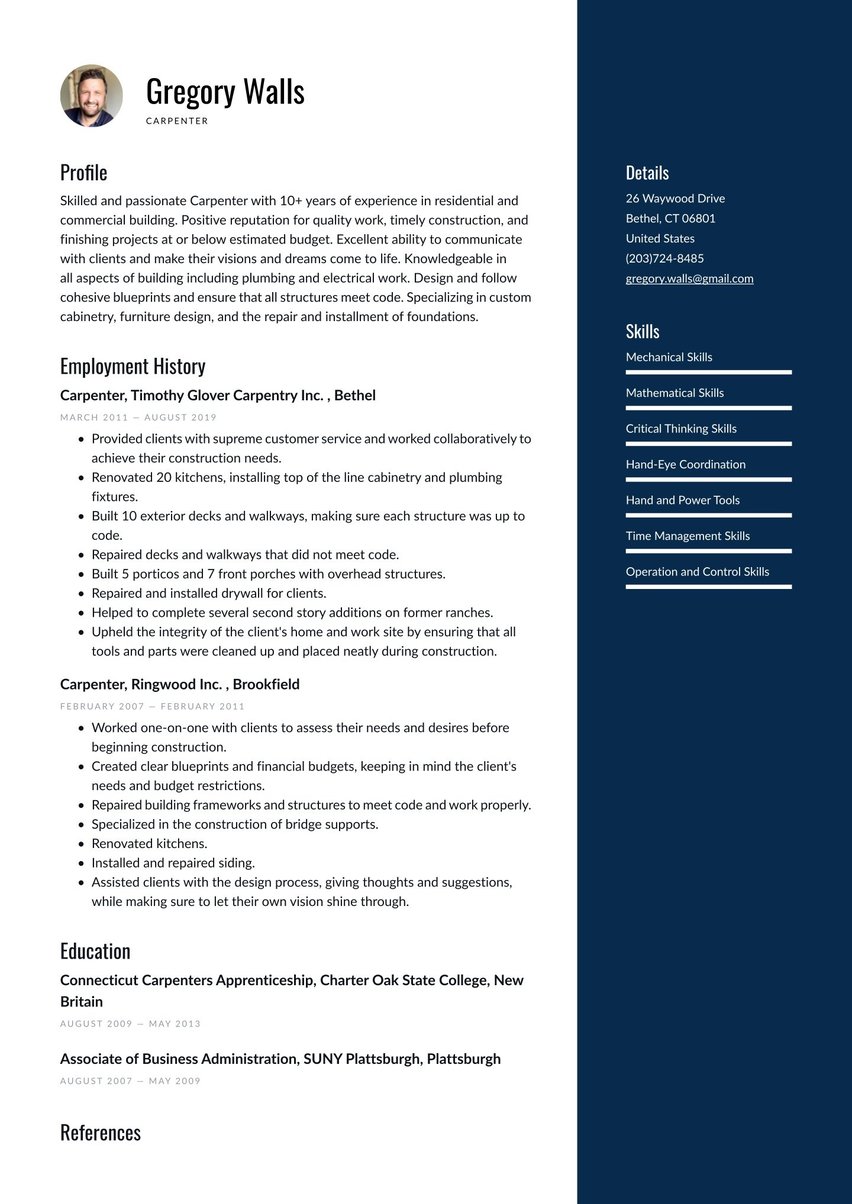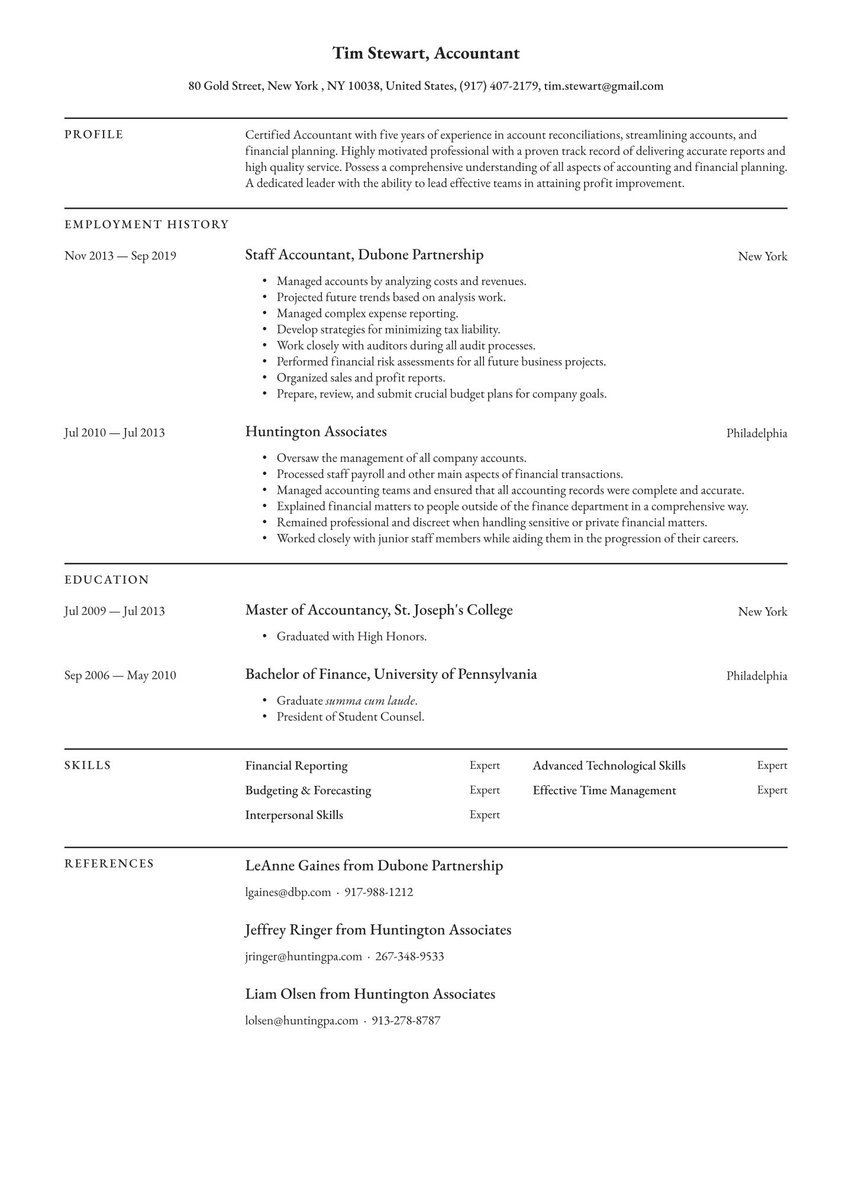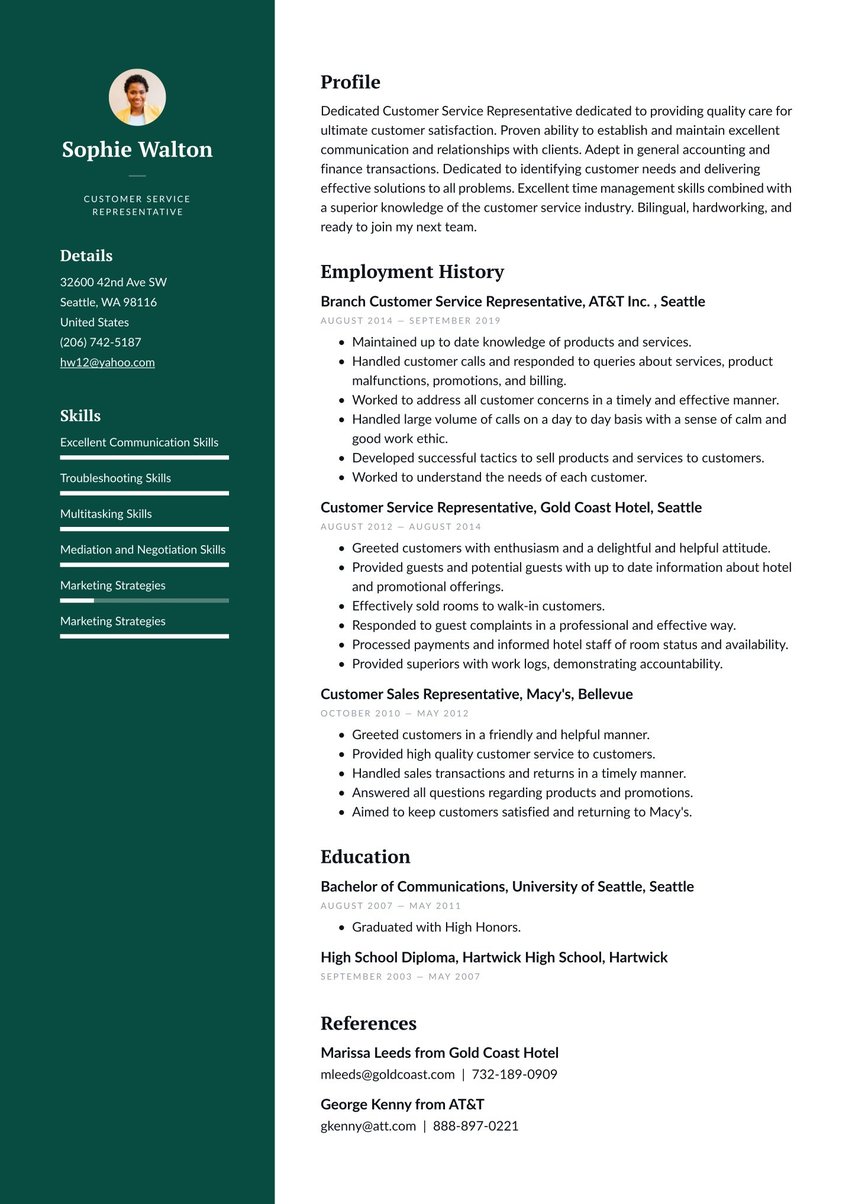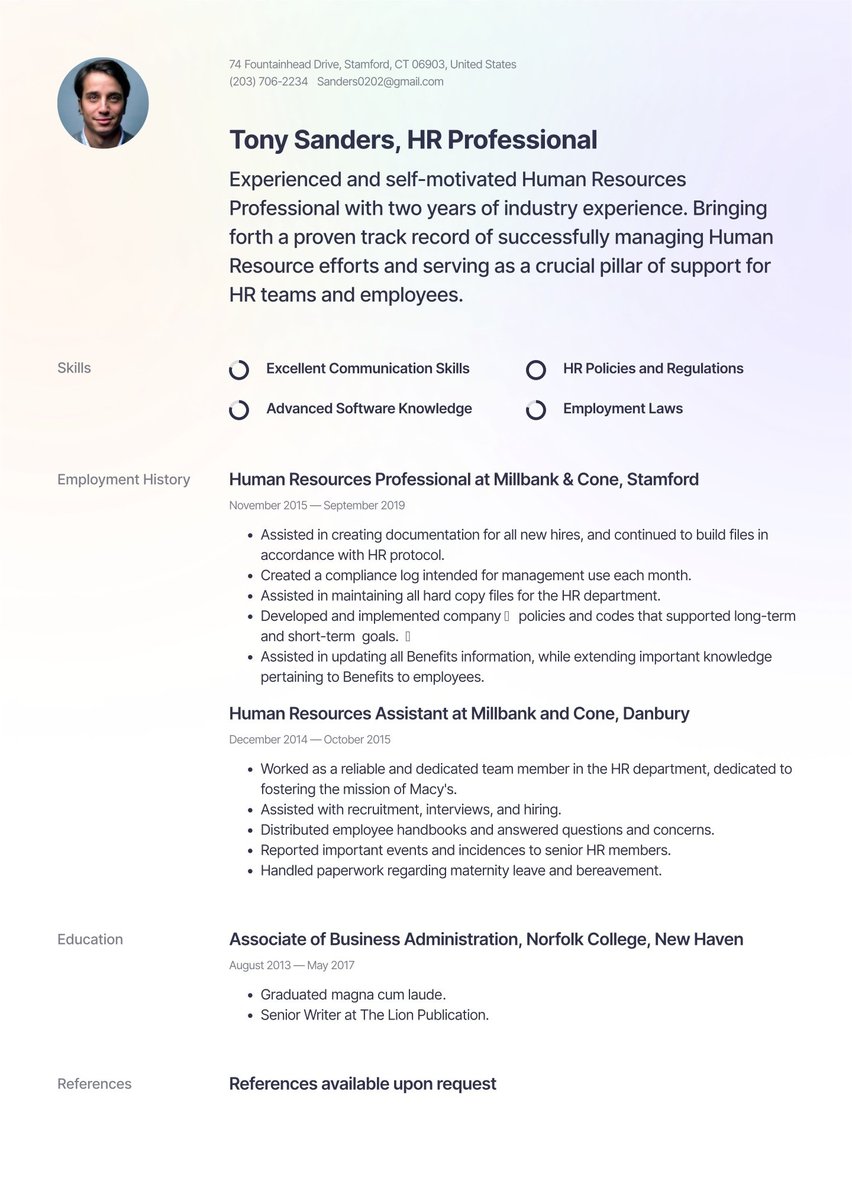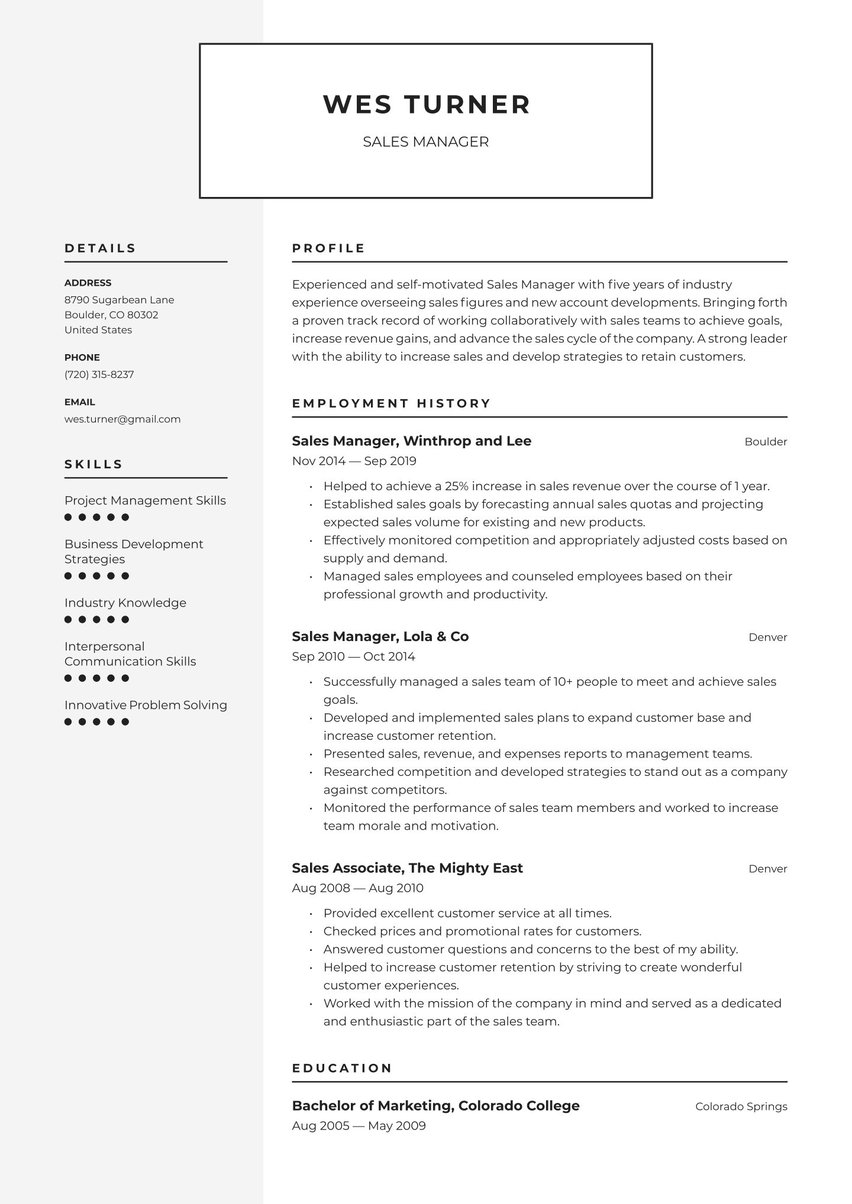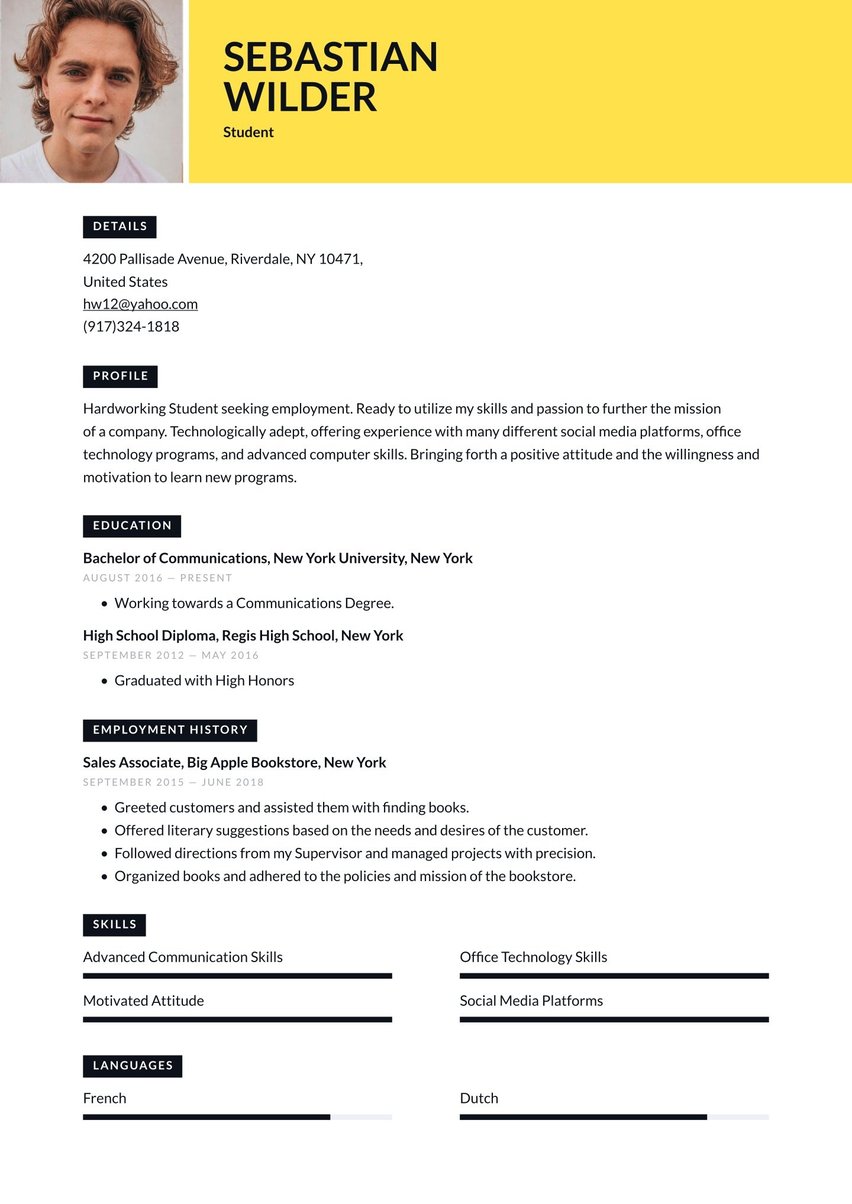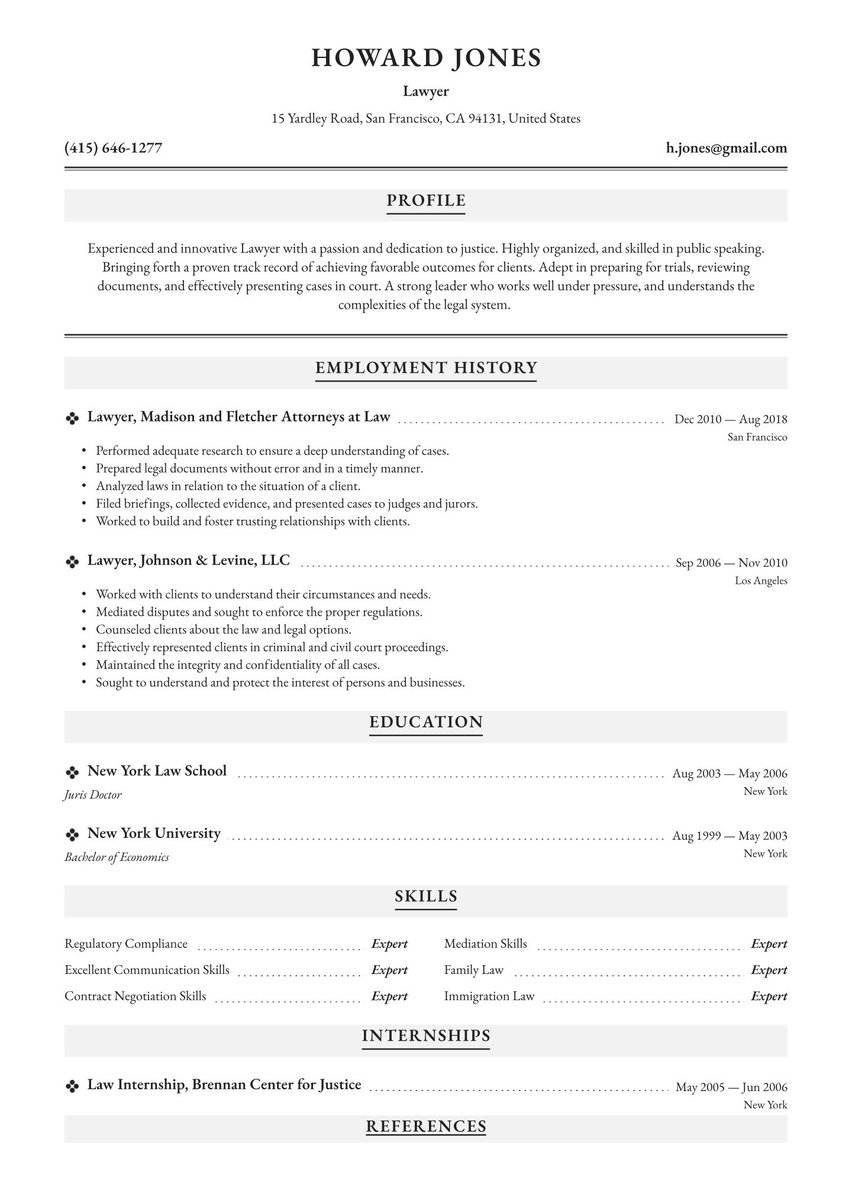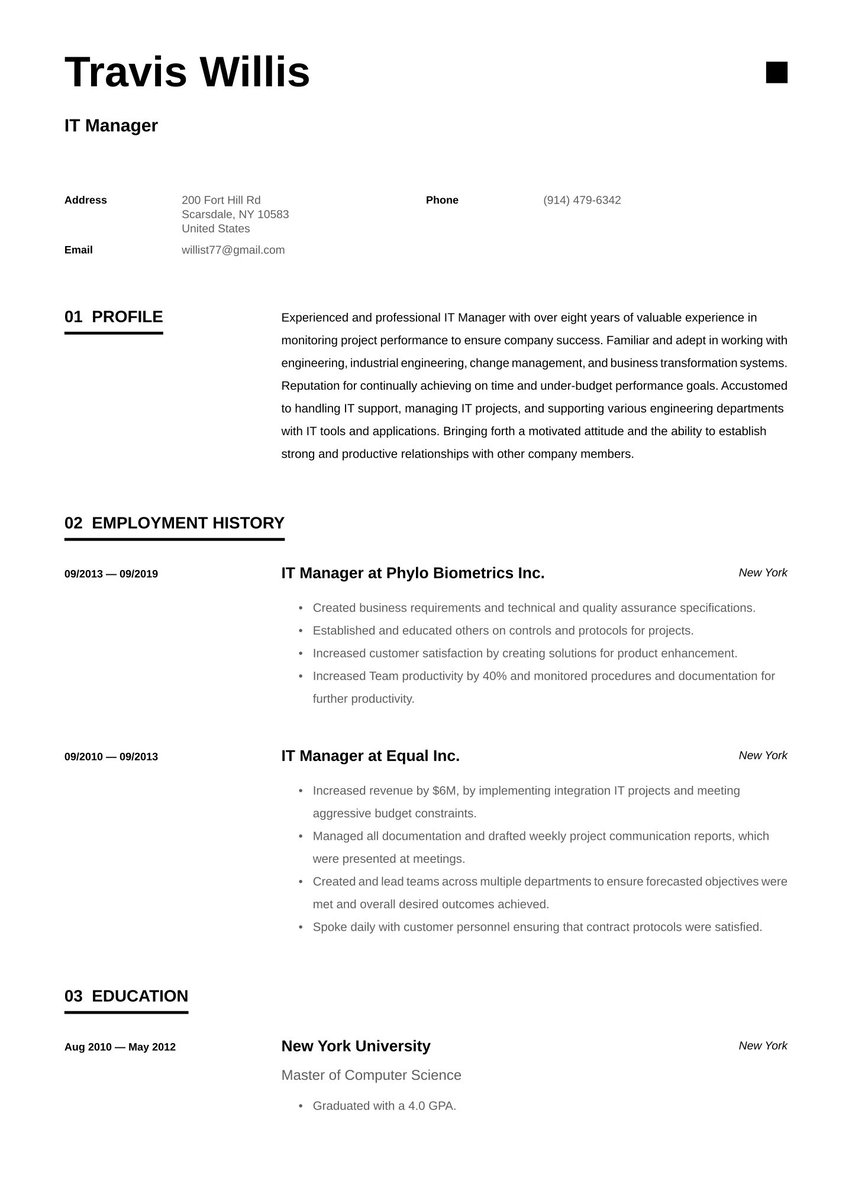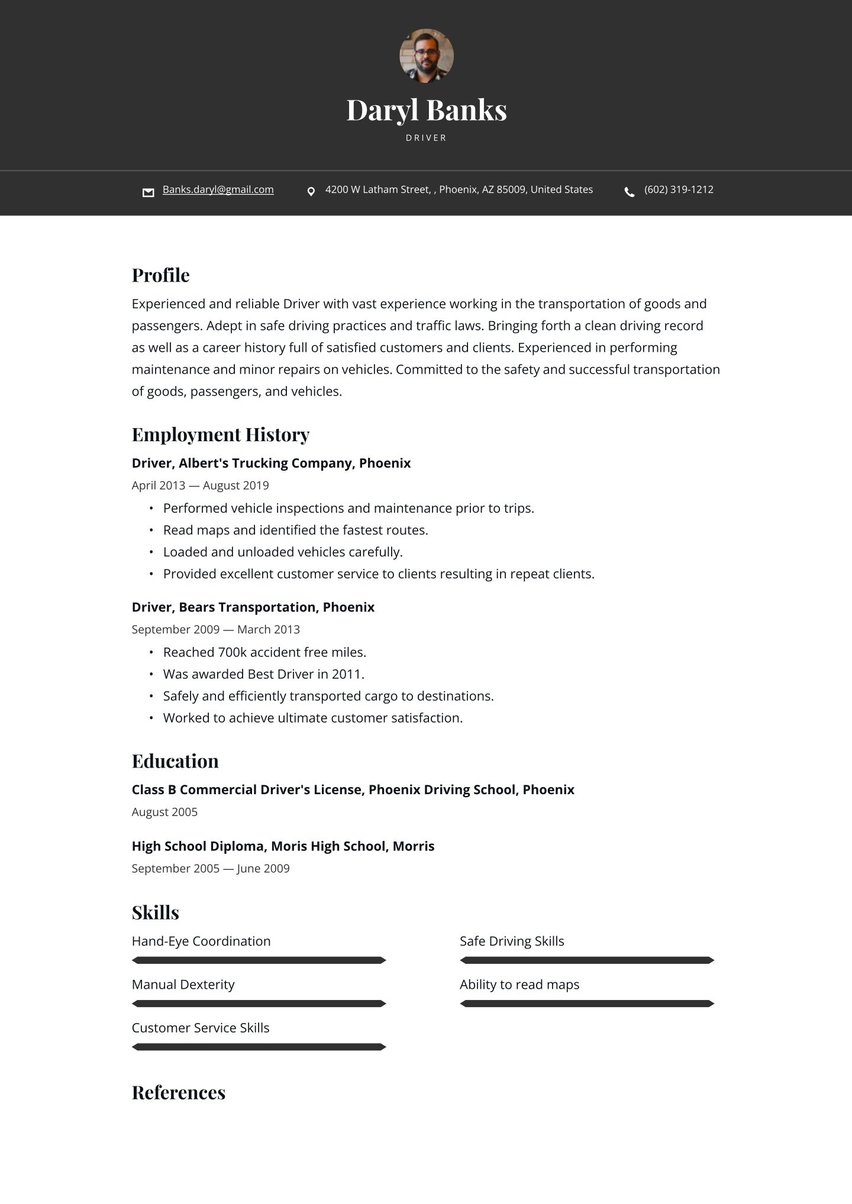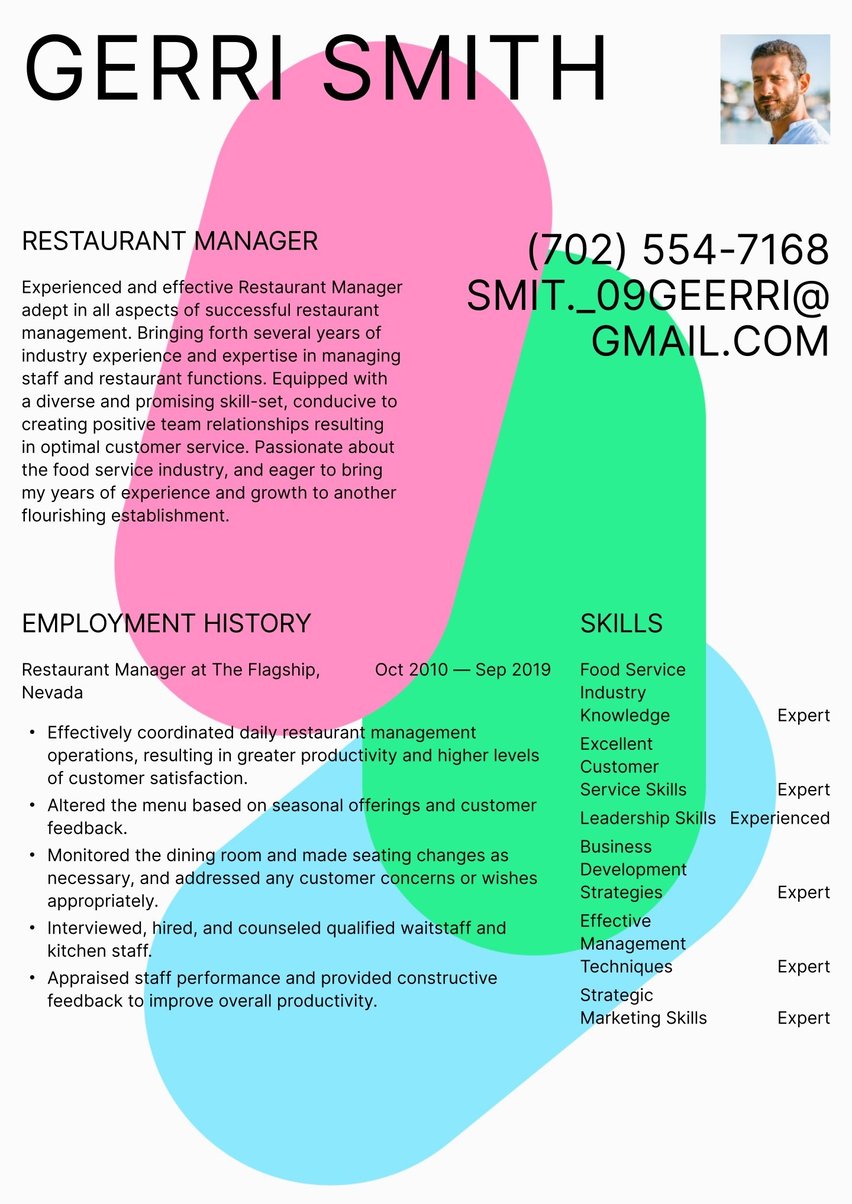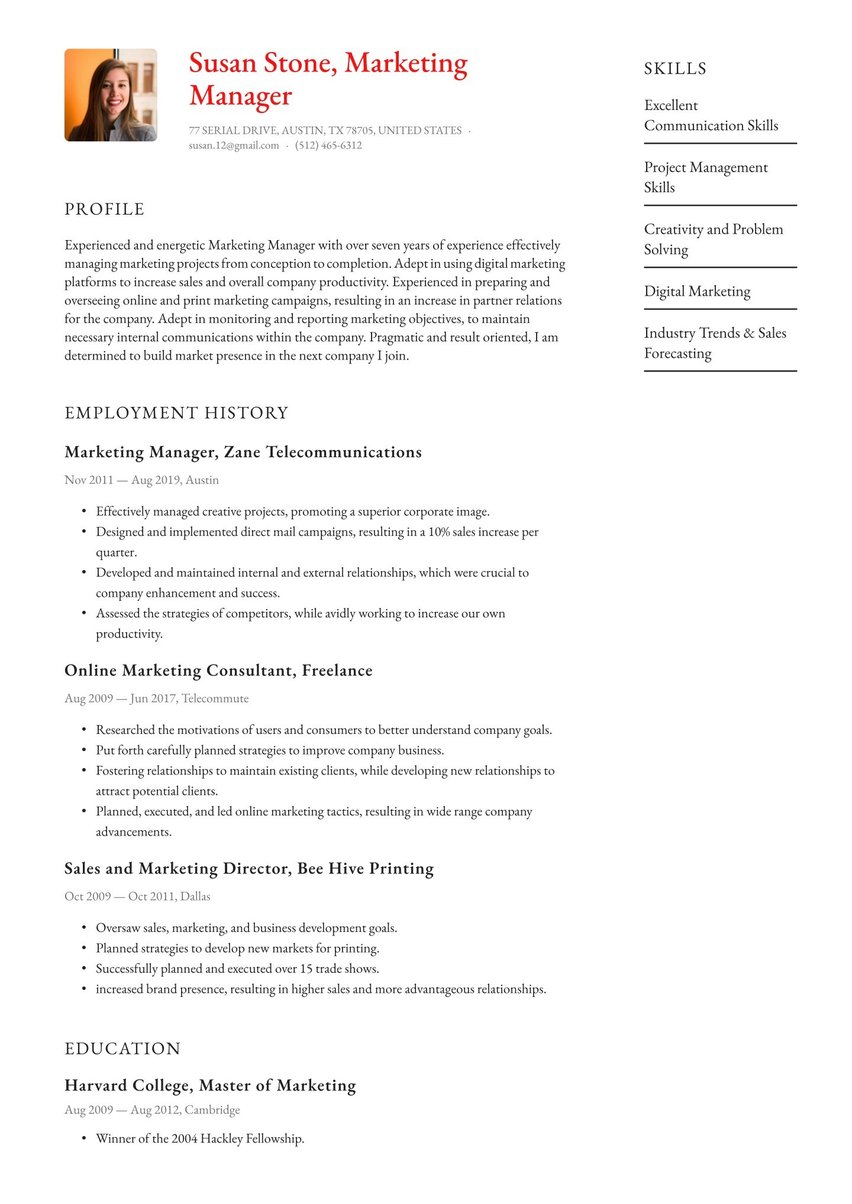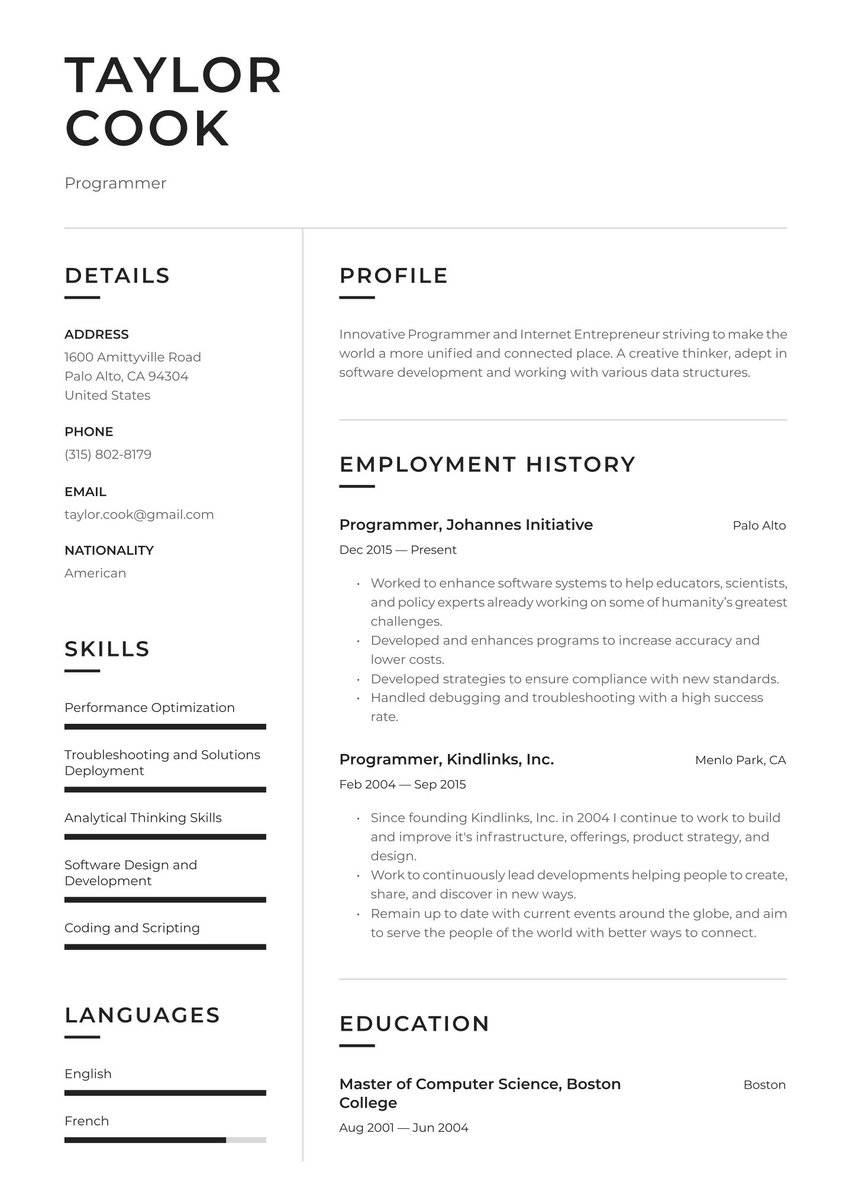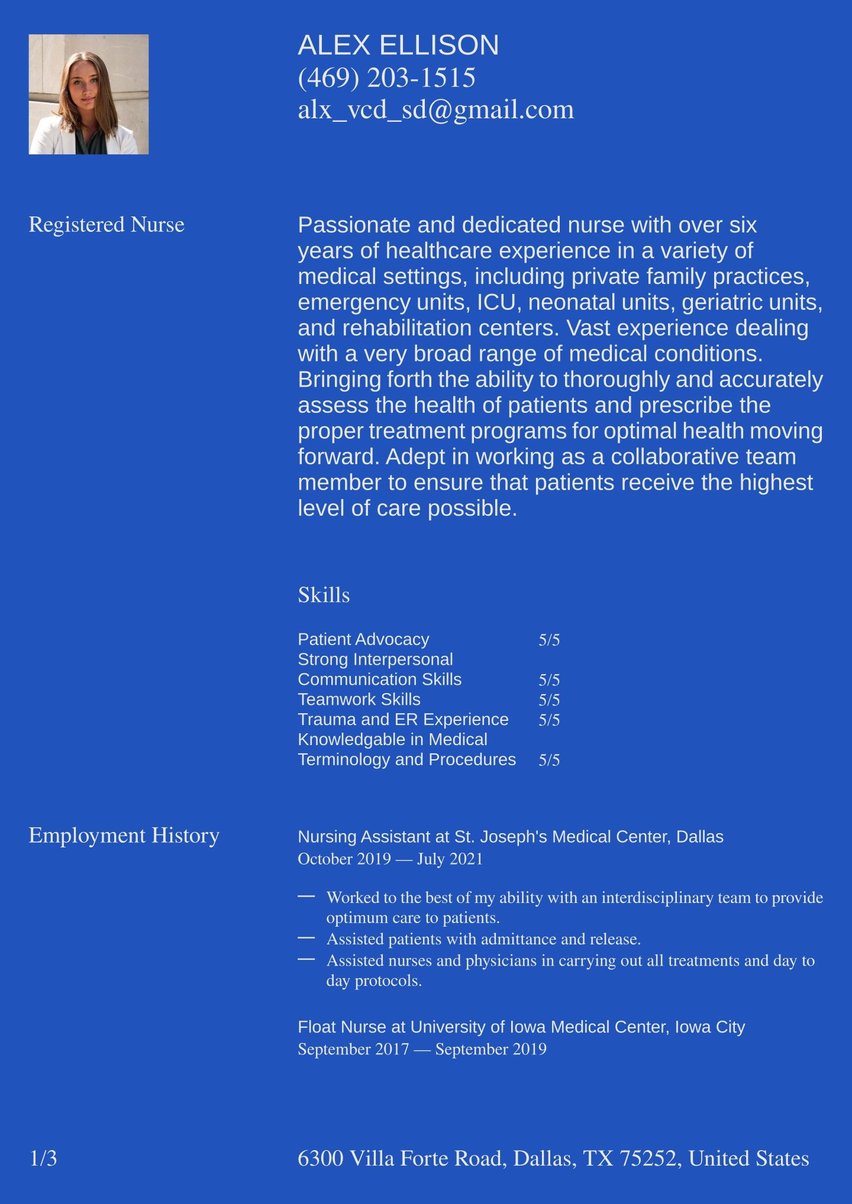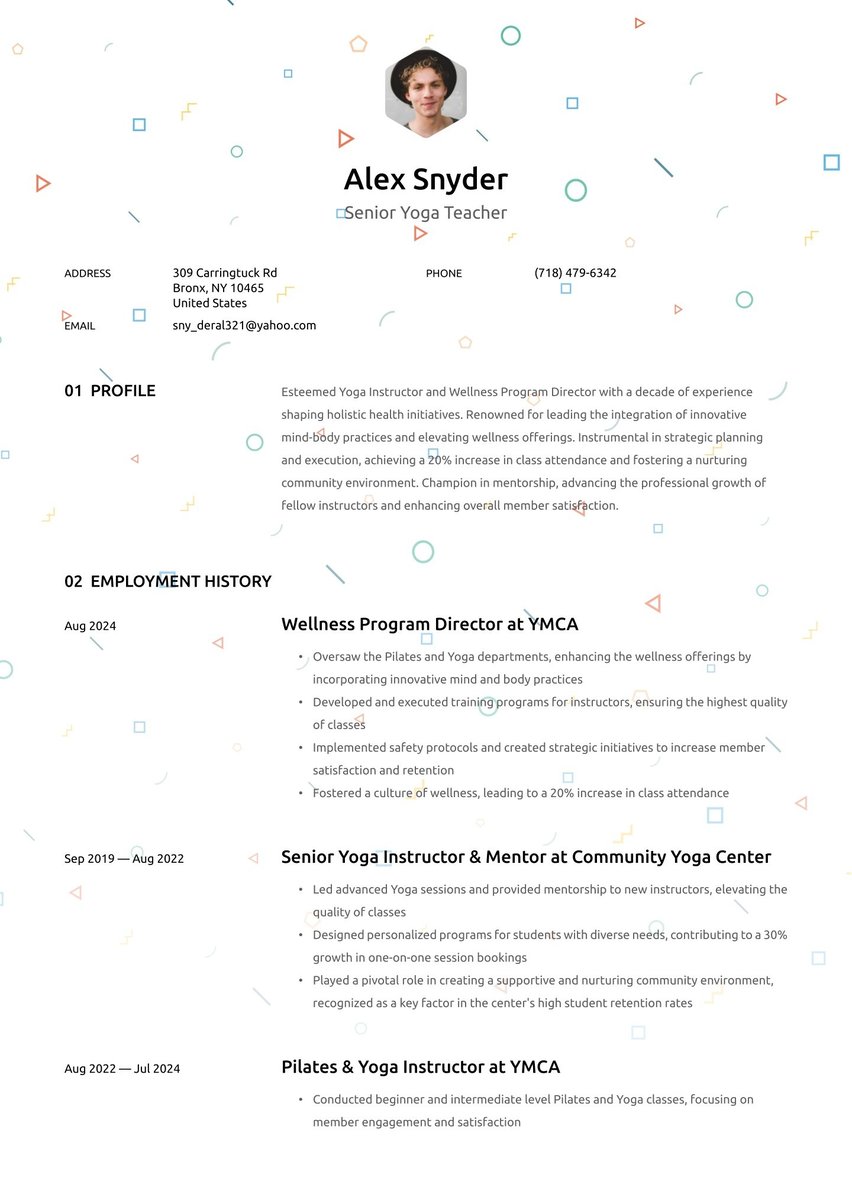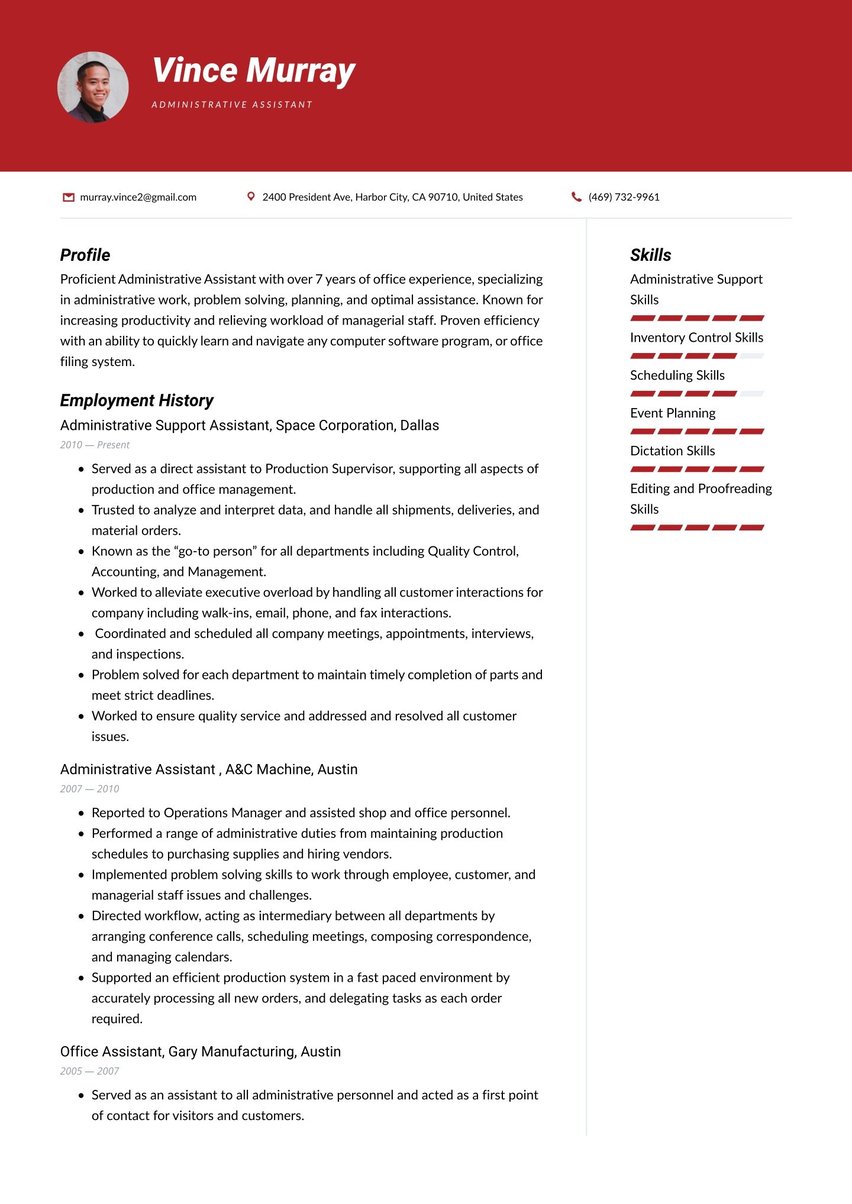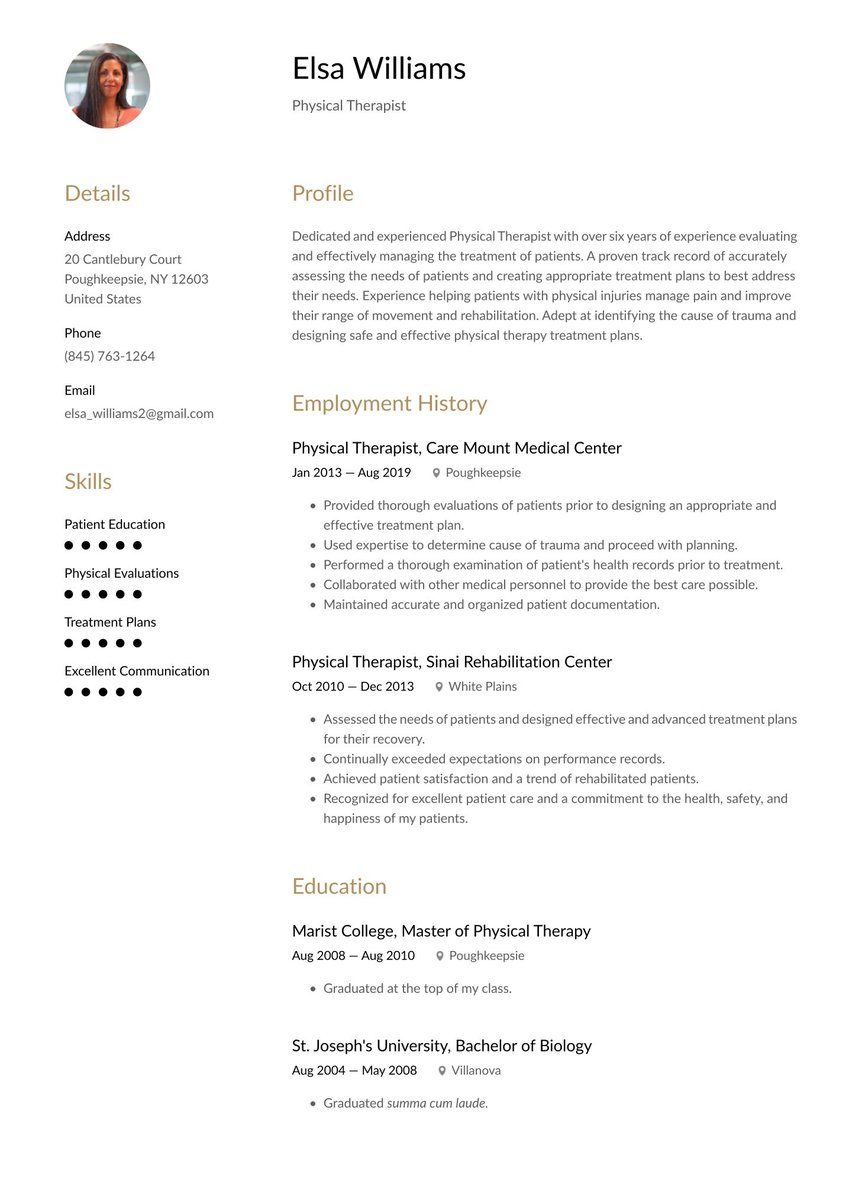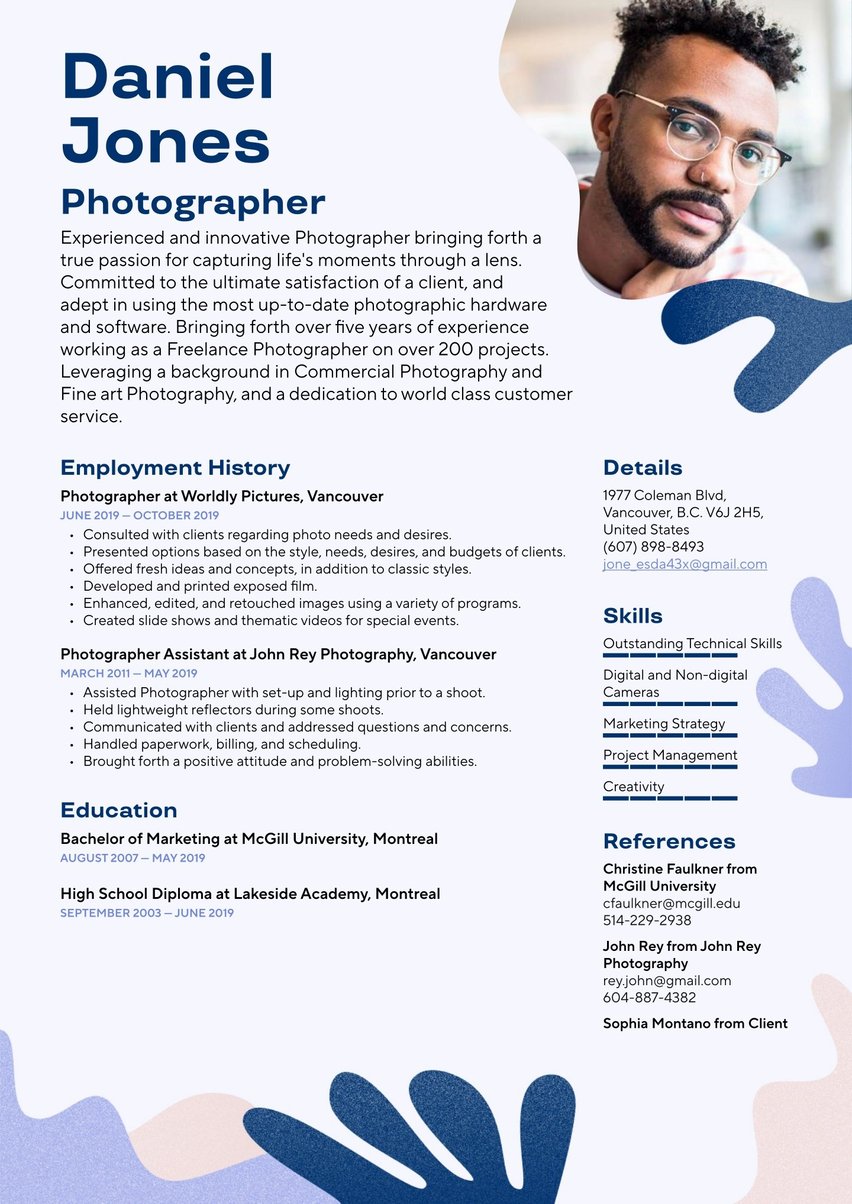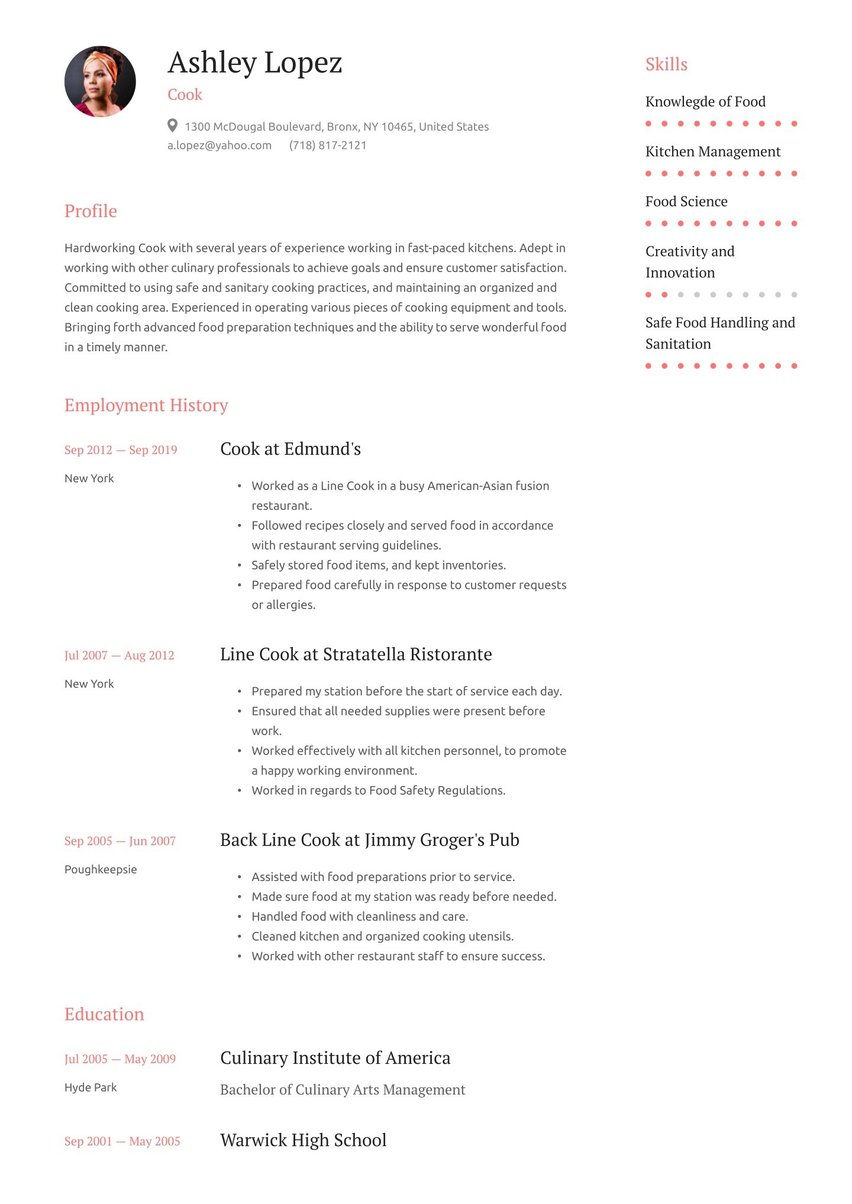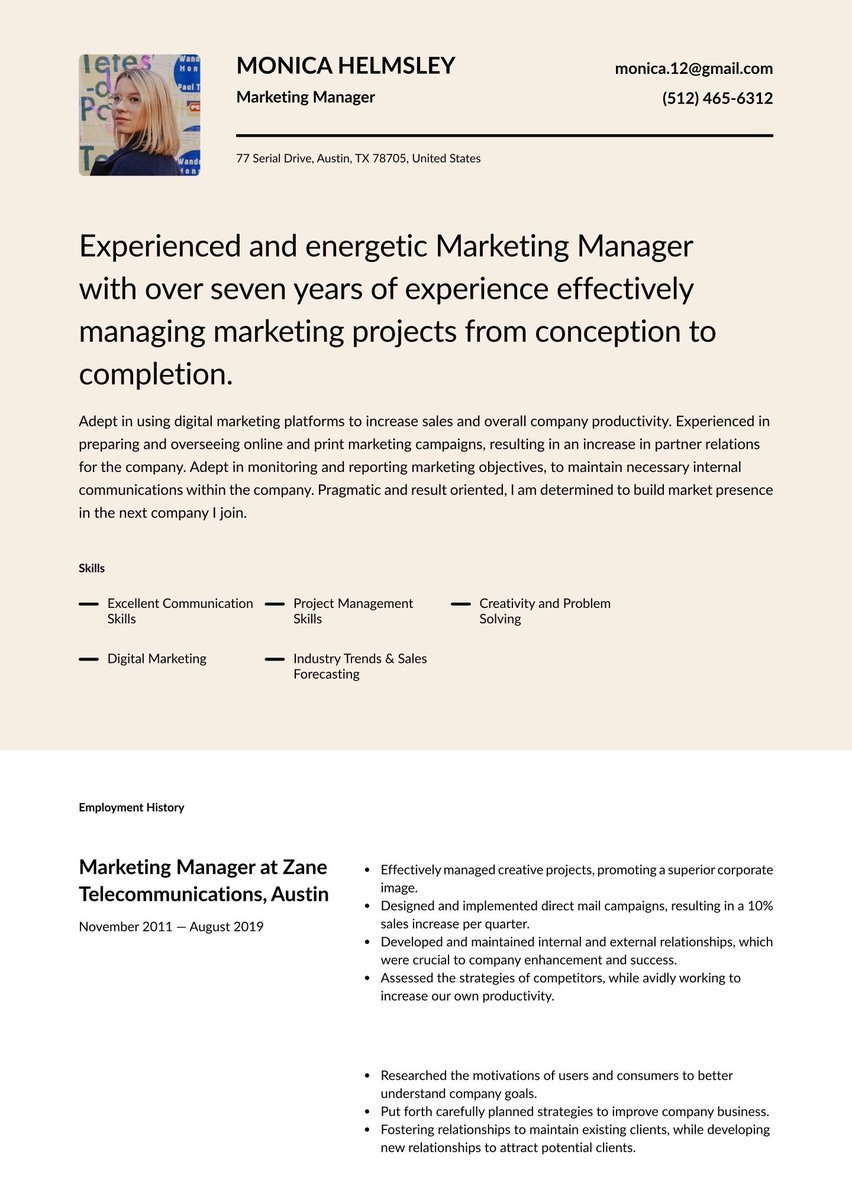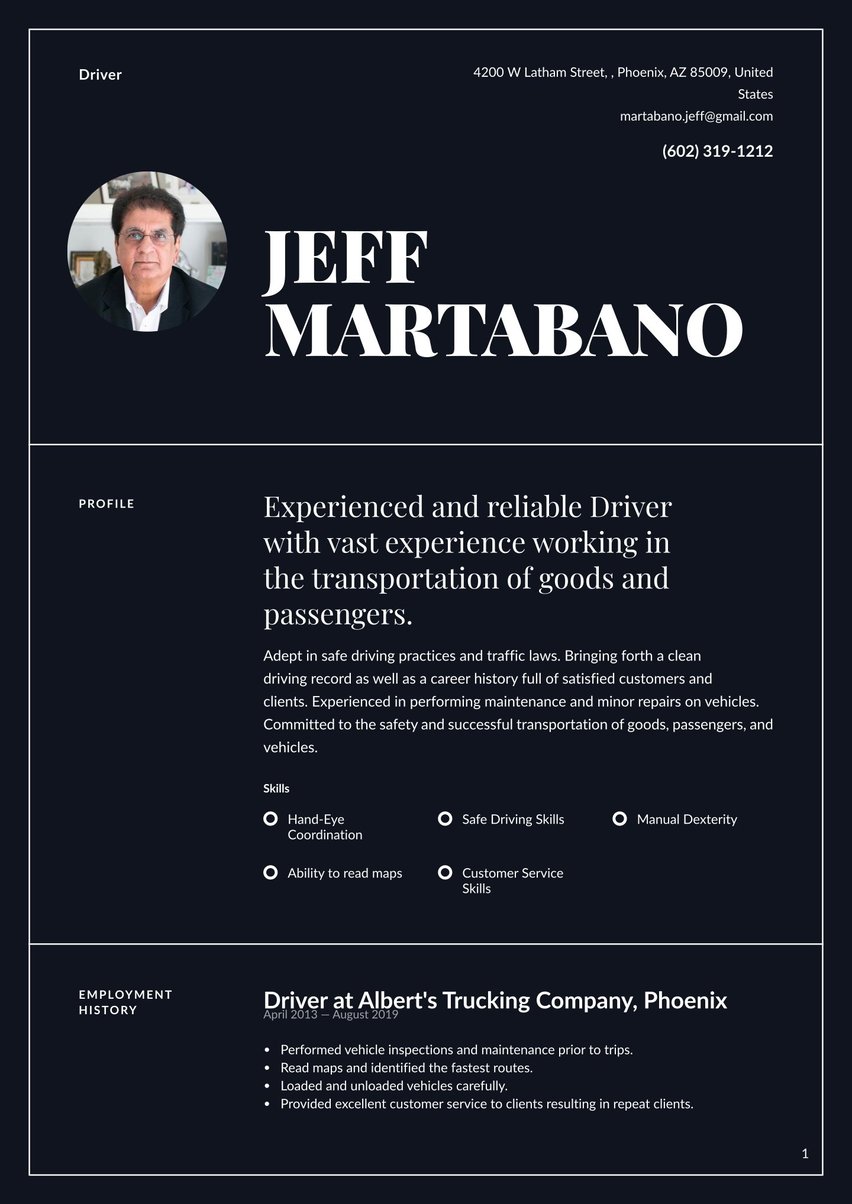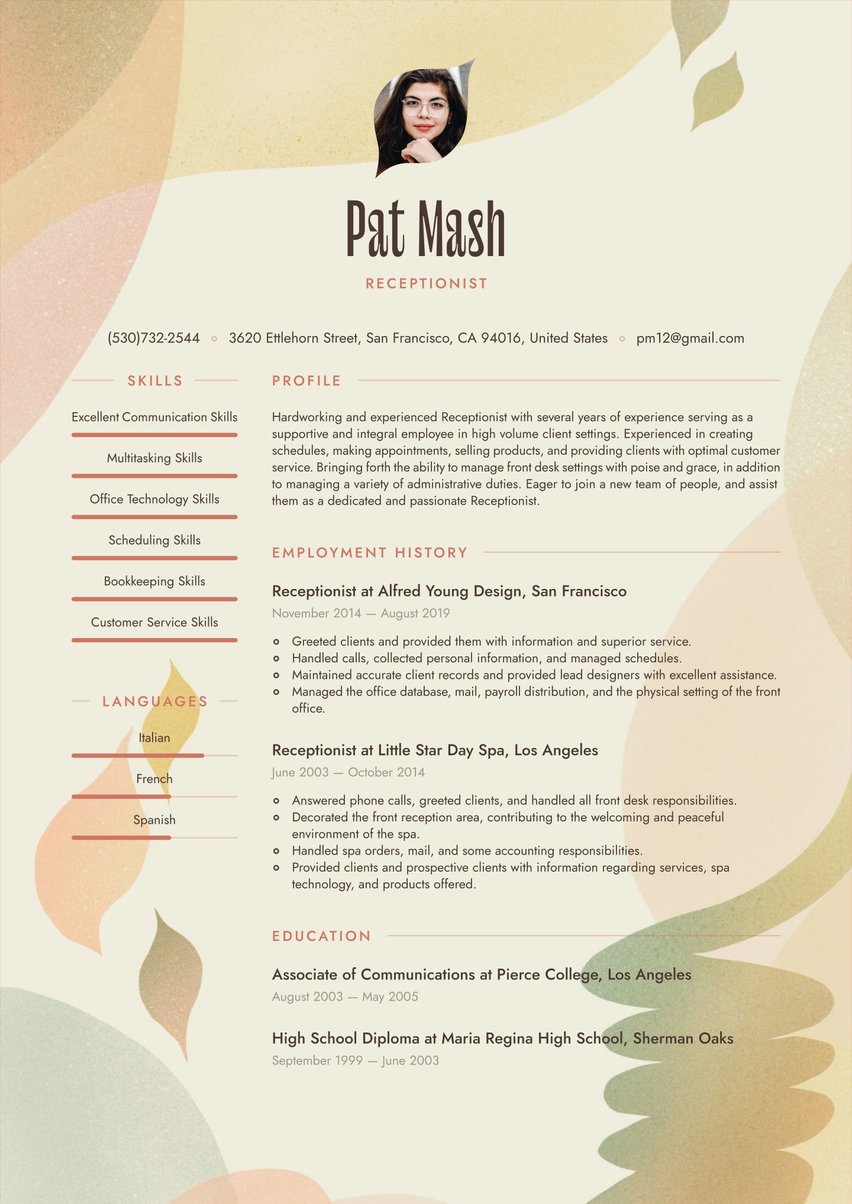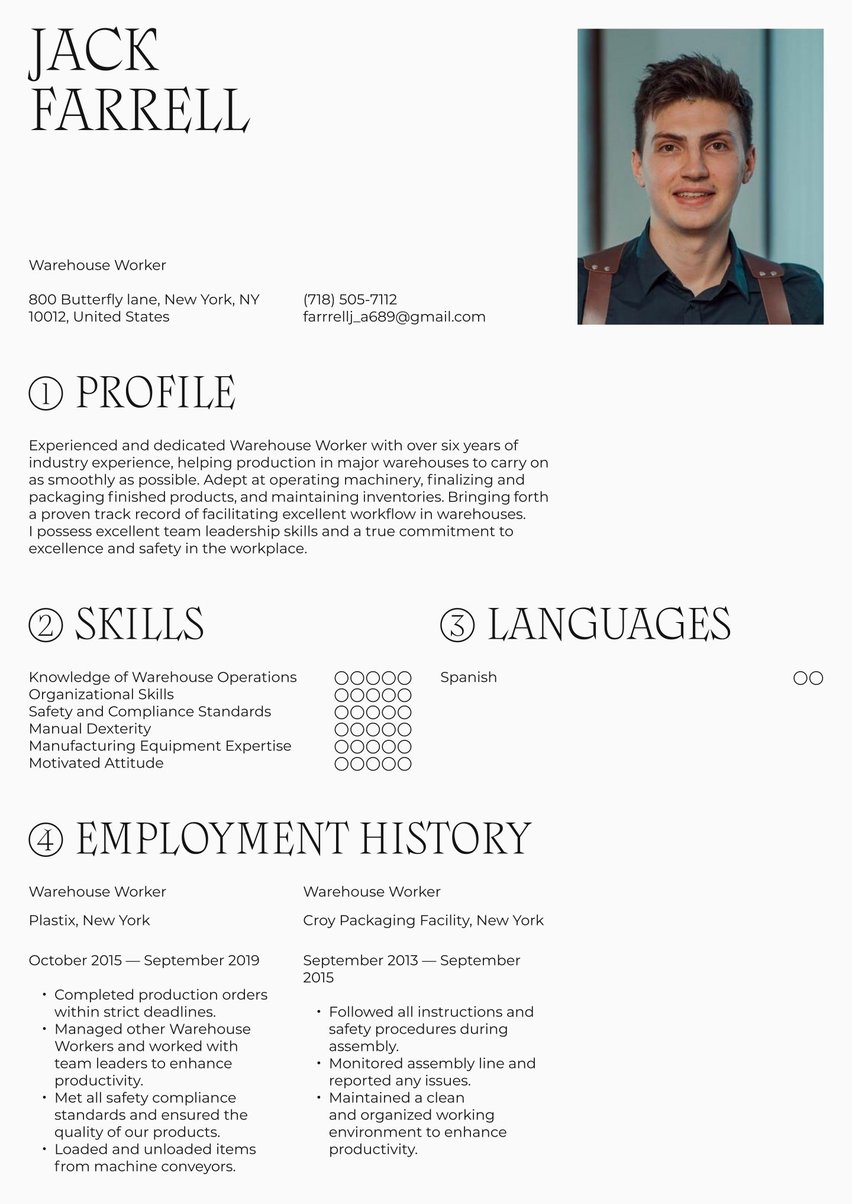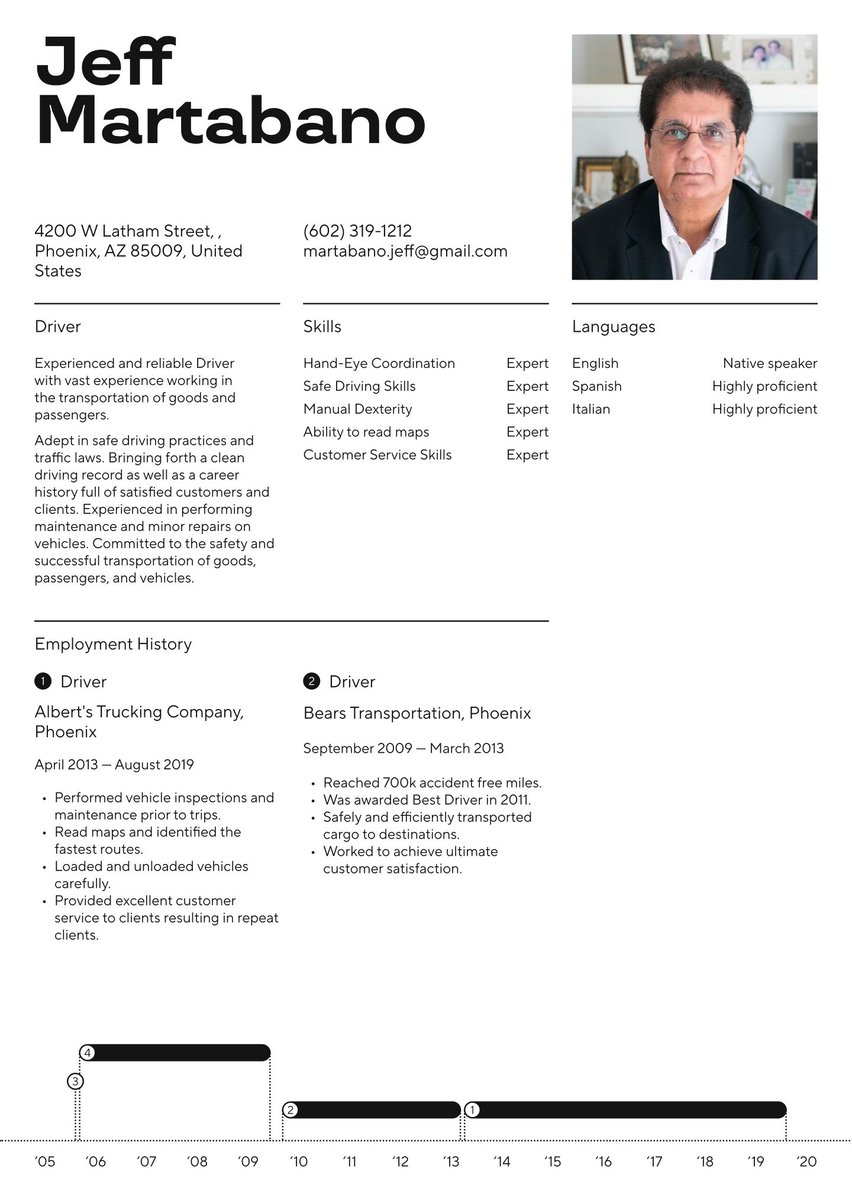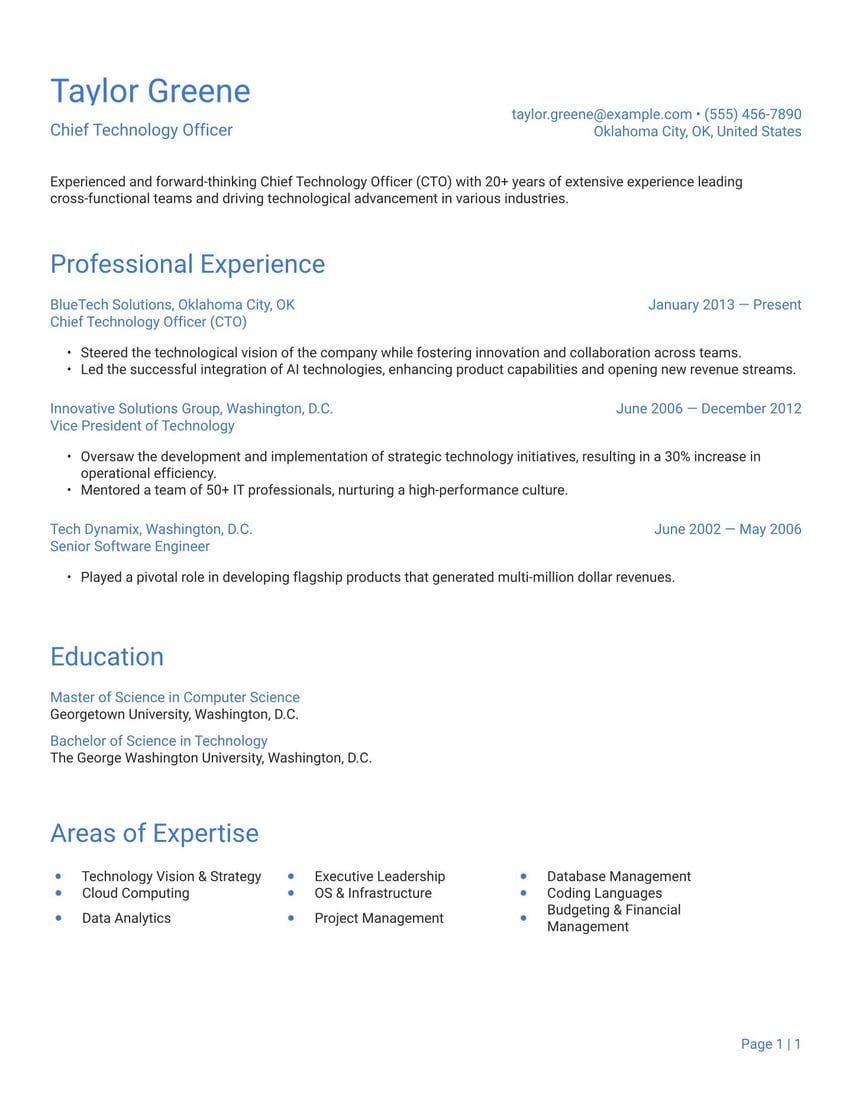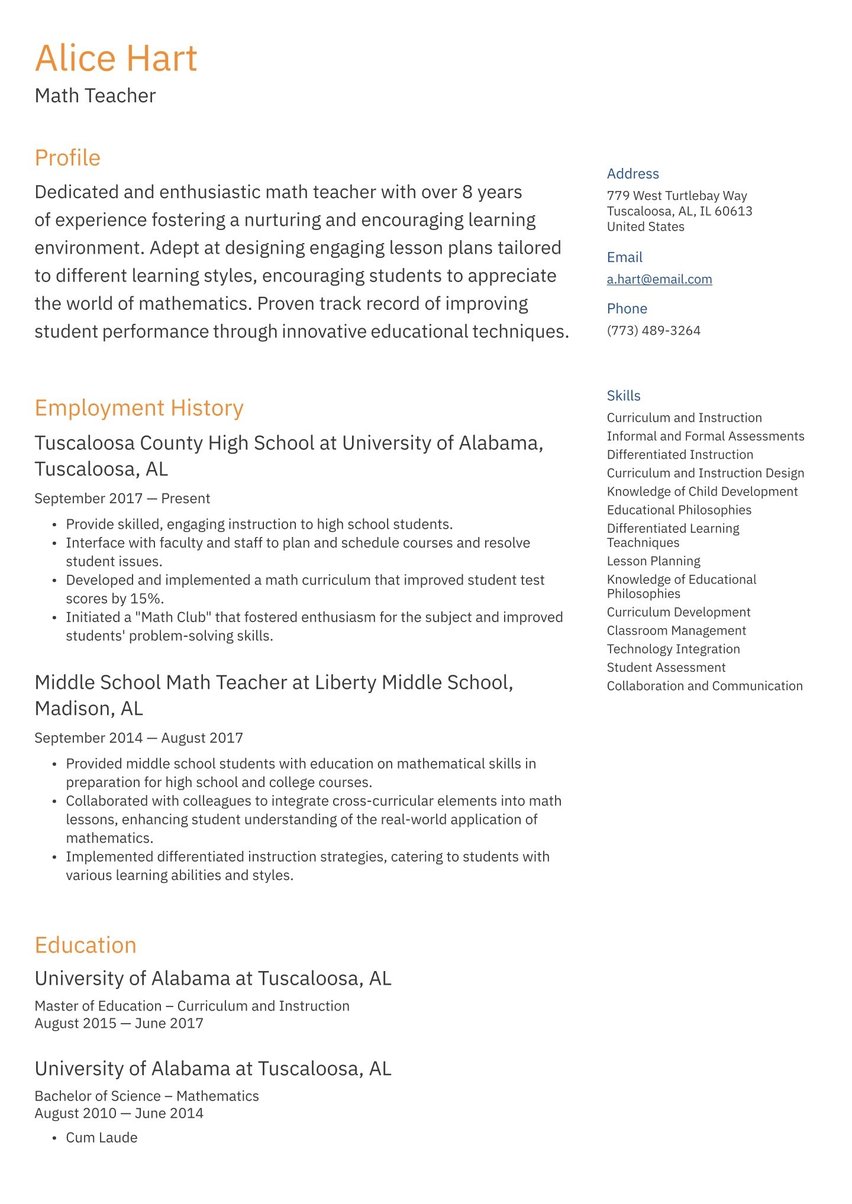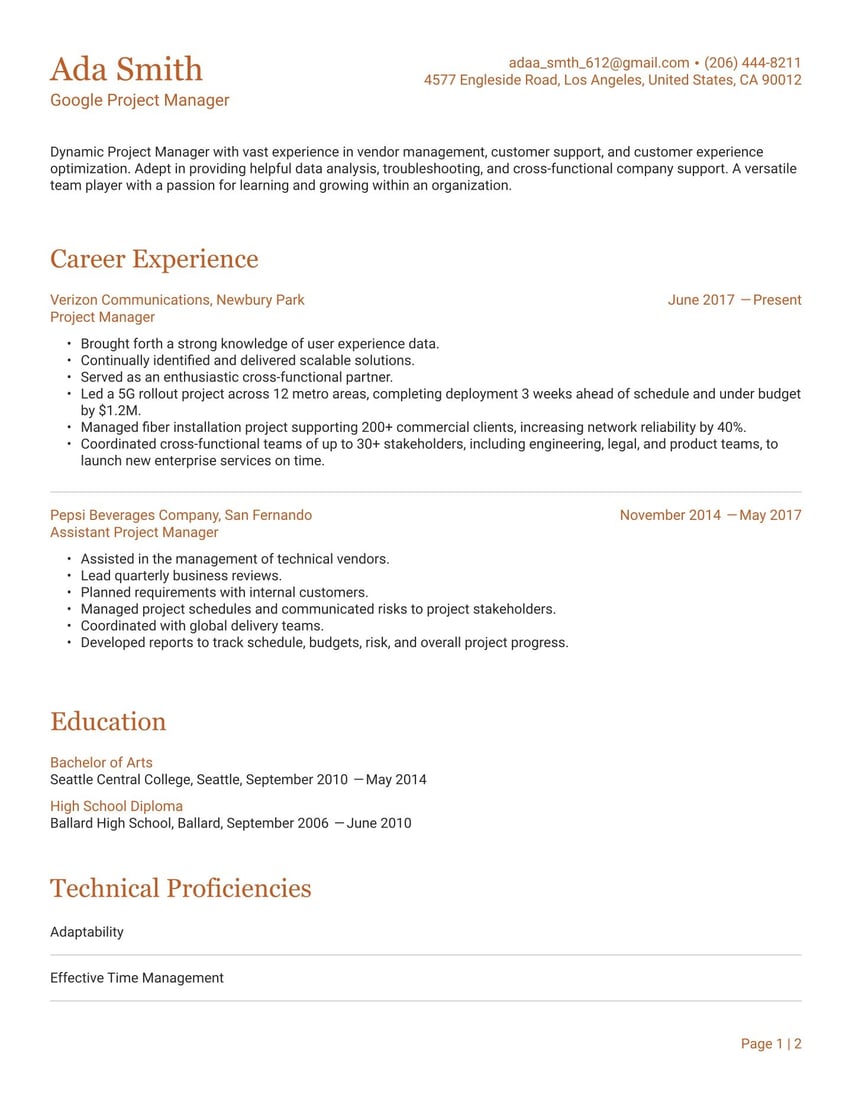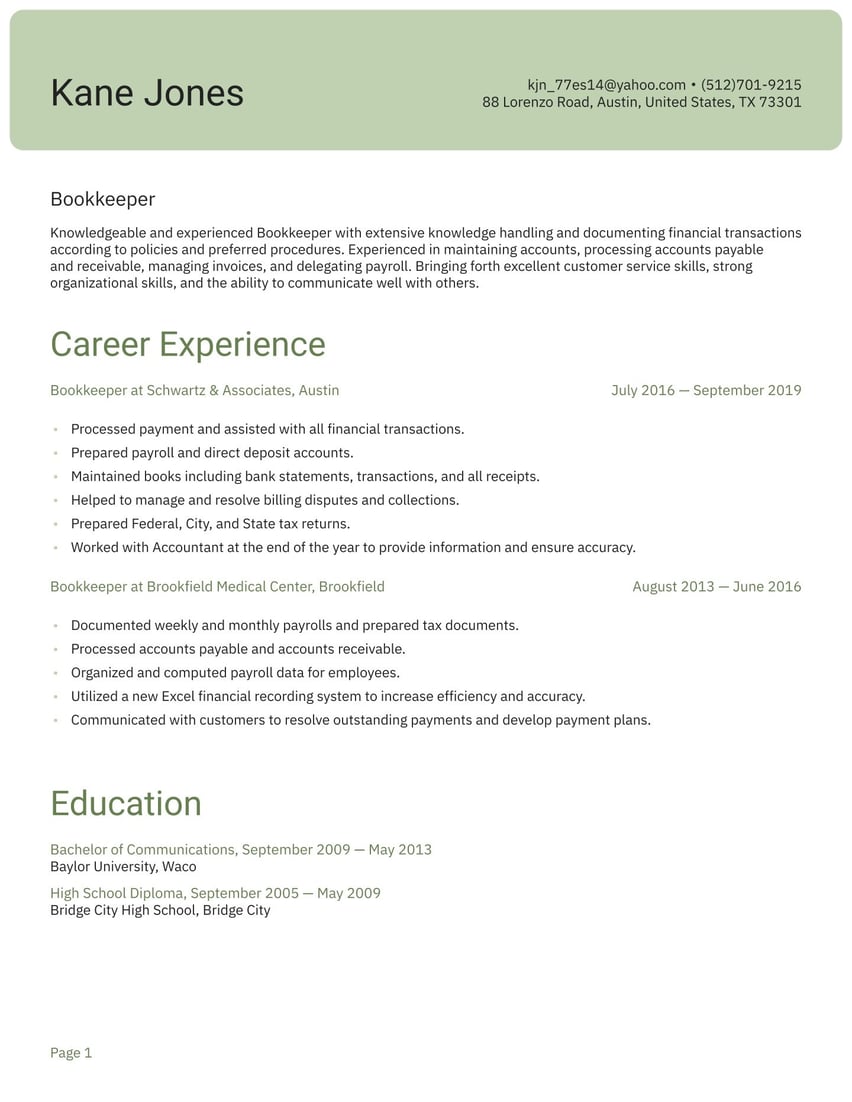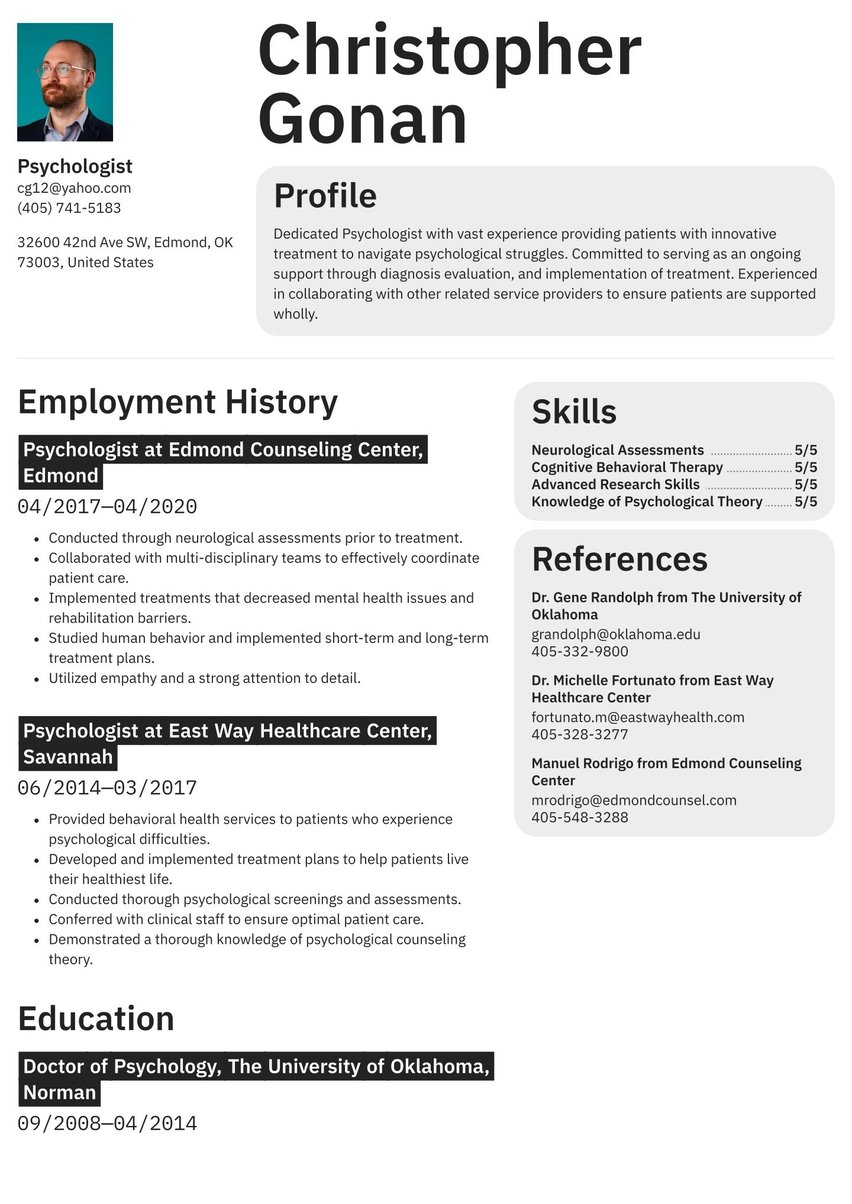08/2012 - 06/2019, Preschool Teacher, Little Seed School, Seattle
- Created developmentally appropriate lesson plans and activities for students ages 2-4.
- Worked to create and maintain a welcoming and stimulating environment for students.
- Maintained excellent communication with parents regarding their child's progress.
- Addressed any concerns from parents in a professional and courteous manner.
- Actively participated in school events and planned the first Spring Auction for the preschool.
- Attended workshops to learn about different educational approaches and tools.
- Recorded observations as written assessments of student performance.
07/2009 - 07/2012, HR Receptionist, Maxwell Publishing House, Seattle
- Assisted the head of HR with all clerical and administrative duties.
- Provided employees with forms and proper insurance applications.
- Answered calls and recorded messages.
- Made copies and handled incoming and outgoing mail.
- Assisted with the purchasing and arranging of supplies.
- Maintained confidentiality of employee files.
- Scheduled and confirmed interviews and appointments.
09/2007 - 07/2009, Administrative Assistant, TV Guide, Seattle
- Served as a reliable Administrative Assistant in the Editorial Department.
- Answered calls and recorded and reported messages.
- Maintained a neat and organized working environment.
- Maintained conference room calendars and scheduled meetings.
- Coordinated travel plans and scheduled appointments.
08/2005 - 05/2009, Bachelor of Communications, University of Washington, Seattle
- Spanish
- Self Starter
- Interpersonal Communication
- Work Ethic
- Organization Skills
- Presentation Skills
- Leadership Skills
If you’re ready for your next professional challenge, you’re in good company—a recent study found that more than half of workers are looking to make a career change!
There are a lot of decisions that come with a career change, but one thing’s for sure: you’ll need a strong resume that highlights your transferable skills and shows why you’re the right candidate for a new industry.
Luckily, we’re here to help. This complete guide will help you understand the best ways to approach your career change resume and will provide plenty of adaptable sentences that you can modify for your own application.
Resume guide for a career change resume
Accelerate success with Resume.io. Our guides and resume examples cover over 500 professions, and our resume builder makes creating a compelling resume easier than ever.
This resume guide and corresponding career change resume example will cover the following:
- How to write a career change resume
- Choosing the right resume format for career changes
- How to add your contact information
- Using summaries
- Adding your relevant experience
- Listing education and qualifications
- Picking the right resume design/layout
How to write a career change resume
The very first step in writing your career change resume is understanding what sections to include. Your resume should contain the following elements:
- The resume header
- The resume summary (aka profile or personal statement)
- The employment history section
- The resume skills section
- The education section
Every person’s career change will be a unique journey, but we have some general advice to help you navigate this pivotal moment. The first step is to research and make sure you have a complete understanding of your new career.
Decide where you want to go before you jump into the job market. Maybe you already have a dream career in mind. You should still investigate both the skills you need to embark on your new career and the state of the job market.
If you are ready for a change but aren’t sure what direction to head in, some basic research will help. Think about careers that have overlapping skills with your current position. You may be able to take a step in another direction while using the abilities you already have. The U.S. Bureau of Labor Statistics lists the jobs with the highest growth potential through 2030, median salaries, and information on skills and education needed to enter the fields.
Consider the reasons you want to change careers as well. Are you burned out? Is your industry waning? Do you want more flexibility? Are you looking for a higher salary? Make sure your new targeted career will offer the opportunities you seek. One great way to do this is by connecting with professionals already working in the new field and asking them about the realities of the industry.
Optimize for the ATS
Almost all HR departments use ATS software to evaluate candidates and filter out resumes that don’t contain enough keywords from the job description. If you’re applying to jobs online, make sure to consider these three tips to increase your chances of beating these automated software scans:
- Read the job description carefully and place skills and qualifications important to the employer throughout your resume.
- Use common section titles like “Education” or “Employment History” which can be easily parsed by the ATS.
- Choose a clear and easy-to-read layout without any complicated images which could confuse the ATS.
Choosing the right resume format for career changes
For most career changers, the reverse chronological resume format remains the go-to choice. This format focuses on your professional journey, listing jobs in your employment history section from newest to oldest. Recruiters find it easy to scan and see your most relevant experience up front. Each position should have descriptive bullet points highlighting achievements.
However, if you're a recent grad or truly lack experience in your new field, consider exploring the functional and combination resume formats. These offer more flexibility, allowing you to showcase your skills or education above your work history, making them well-suited for emphasizing transferable skills over traditional experience.
Include your contact information
Every career change resume should contain a well-organized header that makes it easy to find your name and contact information. As you’ll see on our adaptable career change resume sample, there’s no need to go overboard with fancy colors or formatting.
The most important goal is that your contact information is easily accessible. You should adapt the style of your header to the job you’re applying to. Here are the essential points to include:
- Full name & title. List your first and last name. Use the title of the new role you are pursuing instead of your previous career.
- Professional email address. Use a clean format like firstname.lastname@gmail.com. Don’t use a quirky, unprofessional email address.
- Phone number. List a number where you can be readily contacted, with a professional voicemail greeting.
- Location. List only your city and state. Don’t list street address or zip code. It’s both outdated and unsafe. Note 'Willing to Relocate' here if applicable.
Don’t include:
- Date of birth: Not necessary and could potentially lead to age discrimination.
- Personal details: Marital status, social security number, passport number, etc.
Jessica Anderson
Digital marketer
201-000-0900
j_anderson@email.com
Jess Anderson
Career changer
201-000-0900
Jess_says_hi@email.com
Make use of a summary
A summary is one of the most important sections on your career change resume as it will allow you to speak directly to the employer and explain how your previous career has set you up for this move.
These 3-5 sentences should highlight your biggest accomplishments and tell recruiters how that will translate into your new chosen field. In either case, make sure you are attentive to keywords and phrases. Do not force them into your summary but use them appropriately. Be proud and show off your professional personality and passion without exaggerating.
Remember to use as many powerful action verbs and job-specific information as you can. Highlighting your key attributes and talents that prove your qualifications and accomplishments is crucial.
Need inspiration for your summary? Check out our related resumes:
- General resume example
- Self-employed resume example
- Traditional resume example
- Freelancer resume sample
You can find adaptable career change resume example summaries below:
Highly motivated project manager with 5+ years of experience in managing complex software development projects seeking to leverage analytical skills and problem-solving abilities to transition into a data analyst role. Proven track record of data collection, analysis, and reporting to optimize project timelines and budgets. Eager to contribute data-driven insights to inform strategic decision-making.
Results-oriented marketing manager with 7 years of experience developing and executing successful marketing campaigns. Seeking to leverage strong communication, relationship-building, and negotiation skills to excel in a sales manager role. Proven ability to understand customer needs and translate them into actionable strategies. Passionate about exceeding sales targets and building strong client relationships.
Compassionate registered nurse with 10 years of bedside experience seeking to leverage clinical expertise and patient advocacy skills to make a broader impact on public health. Highly motivated to transition into a public health specialist role and contribute to preventative healthcare initiatives. Proficient in data analysis, communication, and community outreach.
Outline your career change work experience
Your employment history or experience highlights your biggest professional successes and accomplishments. Each bullet point should tell of a challenge, your actions to solve it, and the results you achieved. Use data and details wherever possible.
Start by creating subheadings with your previous role, the employer’s name, dates worked, and location. Underneath, add 4-5 bullet points that describe your professional responsibilities, achievements, and transferable skills needed for your career change.
If your new career overlaps your current career, use the employment history heading and focus on the transferable skills you can demonstrate through your jobs. Recruiters want to see a pattern of growth in expertise and responsibility, so think of your employment history as the story of your professional development.
When your career change takes you in a completely different direction, the experience heading may serve you better. Here you can include your involvement in activities that are not work-related but are relevant to your new career. In either case, keep the ATS in mind. Use strong action verbs that describe you as a go-getter.
Take a look at these bland bullet points:
- “Responsible for completing assigned tasks.”
- “Developed skills in various areas.”
- “Worked on projects with a team.”
Now check out these more engaging options:
- “Increased team efficiency by 20% through implementing a new project management system, reducing task completion time by an average of 1 day.”
- “Developed proficiency in 3 new programming languages (Python, Java, C++) within 6 months, increasing personal coding output by 40%.”
- “Successfully led a cross-functional team of 5 in developing a new marketing campaign, resulting in a 15% increase in customer acquisition.”
Here's the employment history section from our career change resume example:
Preschool Teacher at Little Seed School, Seattle
August 2012 - June 2019
- Created developmentally appropriate lesson plans and activities for students ages 2-4.
- Worked to create and maintain a welcoming and stimulating environment for students.
- Maintained excellent communication with parents regarding their child's progress.
- Addressed any concerns from parents in a professional and courteous manner.
- Actively participated in school events and planned the first Spring Auction for the preschool.
- Attended workshops to learn about different educational approaches and tools.
- Recorded observations as written assessments of student performance.
HR Receptionist at Maxwell Publishing House, Seattle
July 2009 - July 2012
- Assisted the head of HR with all clerical and administrative duties.
- Provided employees with forms and proper insurance applications.
- Answered calls and recorded messages.
- Made copies and handled incoming and outgoing mail.
- Assisted with the purchasing and arranging of supplies.
- Maintained confidentiality of employee files.
- Scheduled and confirmed interviews and appointments.
Administrative Assistant at TV Guide, Seattle
September 2007 - July 2009
- Served as a reliable Administrative Assistant in the Editorial Department.
- Answered calls and recorded and reported messages.
- Maintained a neat and organized working environment.
- Maintained conference room calendars and scheduled meetings.
- Coordinated travel plans and scheduled appointments.
How to write a career change resume with no experience
It’s likely that you will be attempting to make a career change with limited experience in the new field. Here are a few tips to help you write a more effective career change resume:
- Focus on transferable skills. Show how your previous experience has set you up for success in your new career. You shouldn’t be embarrassed of your past jobs; instead, show how your fresh perspective can serve as a strength and help propel the employer forward.
- Gain new qualifications. You can’t make a successful career change without the basic qualifications needed for the new job. Spend some time in online courses and make sure you have the required certifications listed on your resume.
- Network. Meet with current employees of companies that interest you and research the demands of your new career. These connections could help open doors but can also give you a better understanding of the skills to highlight on your resume.
Include the relevant key skills needed for your career change
The skills section is a straightforward catalog and should be tailored to your new career. It is designed as a quick method of getting your top abilities in front of recruiters. Create a Master List of all relevant abilities and choose five or six that best align with the employer’s needs.
Be honest here. Because you are changing careers and may not have as many matching skills as a candidate already in the field, you may be tempted to list skills you are not truly adept at. Avoid this. Recruiters see hundreds of resumes and they are not easily fooled.
Make sure to include any hard skills from the job posting to show that you have the technical knowledge needed for the job. Your soft skills can also be a secret weapon during a career change. Communication, efficiency, and organization apply to nearly every industry and show that you're a well-rounded candidate.
Here's the skills section from our career change resume example:
- Self Starter
- Interpersonal Communication
- Work Ethic
- Organization Skills
- Presentation Skills
- Leadership Skills
Detail your education & relevant career change certifications
List any degrees, certifications, or licenses you have earned in the education section. As with your employment history, make sure to list degrees from most recent to oldest and include the program name, school, dates attended, and location.
If you have several certifications or licenses, consider adding a separate section so that they stand out. Drop your high school diploma if you have a master’s degree or higher.
Your skills section is also a great place to include training, certifications, or new qualifications needed for your career change. If you're a few years out of school, consider dropping any academic achievements to make space for professional awards, memberships, or publications if relevant to your field.
Here's the education section from our career change resume example:
Bachelor of Communications, University of Washington, Seattle
August 2005 - May 2009
Pick the right resume layout and design for a career change resume
Your professional look should be neat and clean. The layout and design of your resume are just as important as the text. Why? There are several reasons:
- Recruiters want to be able to scan for your contact information, current job, and other data quickly
- Your resume’s design is a representation of your image
- The all-important ATS may not find data that is incorrectly formatted
But, what makes a good layout? This may seem counterintuitive, but the simpler, the better! You want recruiters to be able to read every word. That means no big text blocks, no fancy fonts, and just a dash of color if any.
Your accomplishments are what distinguishes you, not any overly fussy design. Legibility takes priority. If recruiters can’t find what they are looking for, they will move on, especially if they would be taking a leap by giving a career-changer a chance.
One way to quickly create a professional layout that stands out to recruiters is by using an expertly designed resume template which can easily be updated as you apply to new positions.
- Make your contact information stand out.
- Vary the lengths of descriptions
- Create a balance of white space to text.
- Have another person proofread for grammar, spelling, and clarity.
- Put information into headers or footers—the ATS can’t read them.
- Downsize the type to gain space.
- Send files in a format other than PDF—different programs may alter your formatting (Word files are notorious for this issue, don’t use them unless the online application system doesn’t give you a choice).
Career change text-only resume example
Profile
Self-motivated and enthusiastic worker with vast experience in many different fields. Bringing forth a proven track record of achievement and a reputation for positive collaboration. Confident, hard working, and committed to seeing results in whatever position I am in. Reliable and dedicated to finding a place that will benefit from my superior skill set and energetic drive.
Employment history
Preschool Teacher at Little Seed School, Seattle
August 2012 - June 2019
- Created developmentally appropriate lesson plans and activities for students ages 2-4.
- Worked to create and maintain a welcoming and stimulating environment for students.
- Maintained excellent communication with parents regarding their child's progress.
- Addressed any concerns from parents in a professional and courteous manner.
- Actively participated in school events and planned the first Spring Auction for the preschool.
- Attended workshops to learn about different educational approaches and tools.
- Recorded observations as written assessments of student performance.
HR Receptionist at Maxwell Publishing House, Seattle
July 2009 - July 2012
- Assisted the head of HR with all clerical and administrative duties.
- Provided employees with forms and proper insurance applications.
- Answered calls and recorded messages.
- Made copies and handled incoming and outgoing mail.
- Assisted with the purchasing and arranging of supplies.
- Maintained confidentiality of employee files.
- Scheduled and confirmed interviews and appointments.
Administrative Assistant at TV Guide, Seattle
September 2007 - July 2009
- Served as a reliable Administrative Assistant in the Editorial Department.
- Answered calls and recorded and reported messages.
- Maintained a neat and organized working environment.
- Maintained conference room calendars and scheduled meetings.
- Coordinated travel plans and scheduled appointments.
Skills
- Self Starter
- Interpersonal Communication
- Work Ethic
- Organization Skills
- Presentation Skills
- Leadership Skills
Education
Bachelor of Communications, University of Washington, Seattle
August 2005 - May 2009
Key takeaways for building a career change resume
When crafting a resume for a career change, showcase how your existing skills translate to your desired field. Focus on transferable skills like communication and project management, and tailor them to the new role's requirements.
Highlight relevant achievements from past experiences, using data to quantify your impact. Your resume should tell a compelling story of how your transferable skills and experiences position you for success in your new career path.
An online resume builder can make it easy to format a professional resume that puts you on the path to making a successful career change!






















